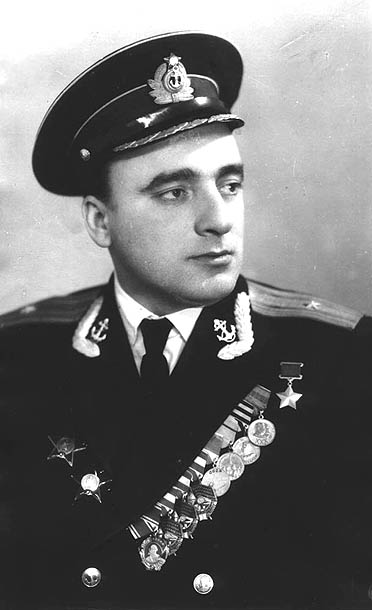
|
HSU Alexei Mikhailovich Batievskii Interview by Konstantin Chirkin |
|
|
Interview by Konstantin Chirkin with HSU Alexei Mikhailovich Batievskii
Editor I. Zhidov.
Translation by Oleg Korytov and Ilya Grinberg.
Special thanks to Svetlana Spiridonova and Oleg Rastrenin.

Batievskii{1}:
I was born in Ukraine at Gorodishe, which lies between Kiev and Poltava.
When I saw first airplane? We walked barefooted at Podol. Dad carried my younger
brother on his shoulders; mom was walking by his side. We were going to visit
my grandfather. Over the church there was a large bird flying. An airplane!
Dad took my brother off his shoulders and said:
— This figure is called a “Death loop”.
That’s how I saw an airplane for the first time. When I was studying at
6th grade, a panic begun — “Po-2” had landed behind the forest.
All school went there. Airplane had to land due to icing. Women brought samovar
of hot water, and poured it on the engine. Two aviators dressed in leather coats
and pants allowed boys to step on the first step and take a look into the cabin.
I looked too: it was filled with instruments that looked like watches.
Pilot warmed up and started the engine, turned around and took off leaving only
a cloud of snow behind them. It happened on Friday. All Saturday and Sunday
my brothers and I made a model of an airplane, but when we brought it to school
on Monday, we found out that boys from senior grades had made airplanes with
so large wings and tails that they couldn’t fit in the doors. It was fascination
with aviation!
Russian language teacher had suggested us to write a composition about "Who
I want to be". I wrote that I want to be a pilot. Another boy, Ivan, also
wrote that he would like to become a pilot. He perished in infantry during the
war…
Once, father took me to regional center Lohvitsa. We sold pears, cheese, apples…
Dad suggested that I should buy any book that I would like to. I noticed a book
“I want to be a pilot”. So I bought it. It was very intriguing to
read about flying, about different instruments. There was a story about a very
important flight that one pilot made: he took off from Sweden, overflew Danish
straights and landed in Denmark. The real distance was approximately 20 kilometers.
But then it was a miracle. Then one kolkhoz worker came to me and said:
— I have a very interesting book about flying, would you like to read
it?
He was really educated and liked books. He gave me well used book «Air
Digest». There was a novel «Wings of Victory». It described
how Red pilot fought during Civil war. Both these books are still in my home
library. He presented it to me because I taught his younger sister to read.
A commission came to check her knowledge. I warned her: Stalin is a General
Secretary of the Communist Party. She replied to this question:
– Stalin – Red Army General.
They simply laughed and it was it…
– Ukraine, 1933 — hunger. Do you remember it?
It was terrible. I, being as small as I was, still understood everything. There
were 22 houses at our street, whole families died out. Poet Oleynik established
a monument to the victims of hunger in Dubno area. Hunger… The reason
for it was strange…
First years after Kolkhozes were organized were productive, even though it was
very little order in organization and management. My advisor in postgraduate
school later became chief of Main Political Directorate, Professor Krinitskiy
Aleksandr Markovich. He was a medical doctor but practiced politics. He was
personally responsible for kolkhozes and reported to Kaganovich in person. Kaganovich
was a shoemaker but was dealing with collectivization of agriculture. Narkom
of agriculture was also a Jew, or some other non-Russian. I read their speeches
at XVII party meeting…
Stalin squeezed grain out of population to sell it for gold, and buy machinery.
It was hard way out of situation, but by no other means we could have been ready
for war with Germany. Crops were good. And the authorities took bread, gold,
and silver from people in order to buy industrial equipment. How did they got
bread? Representative from the regional administration was coming with a pistol.
They would walk in a barn for inspection. We locked a dog in our pigsty; there
was a barrel with grain. They could take it away. Some activist from the city
came with a gun. We told her not to open the door because it was a big dog that
we can't contain. The city girl did not realize the trick and we got away. But
someone else did not get away. Somebody would snitch, and somebody would steal
and hide half-a sack of grain. Things like that happened.
And here a famine struck no crop. During Turkish war my grandfather was awarded
with silver Georgian Cross and large medal "for bravery". I played
with these awards a lot when I was little. Also a colonel presented him with
a clock that played music. When grandfather recalled war at Balkans, he cried.
When the famine struck, father took awards, silver coins and the clock to “Torgsin”,
and came back with two sacks of flour. My uncle had 8 kids, my other uncle had
8 kids also, none of them died. Those, who lived opposite from us had a cow.
They made it too.
– Why your family survived?
Sons were already grown up. They could work and earn something. We had an apiary. We had honey from previous year. Honey does not rot. There also were two rivers with marshy banks. A grass was growing there, roots of which are eatable and contain protein. But people lived nearby and didn’t know about it!
– Your family survived because it had honey?
Yes. And cows. But even those who had a cow died.
– Weren’t you ordered to hand a cow over to kolkhoz?
Cows were not taken to kolkhoz, they took horses. They also tried to take calves. It was a serious and stupid mistake – a head of kolkhoz was a poor peasant, who was stupid and lazy man, who never had a horse before. Horses then were main transport. Collectivization was poorly organized, and this leads to hunger.
– Your family suffered from repressions – your father was imprisoned...
Father was imprisoned because one of the bosses decided to kill a sick horse to make ropes of it. They did it. My father was a foreman and let a Gypsy man to leave his work to skin the horse. My dad was sent to prison for 7 years. The boss got 10 years and the Gypsy also got 10 years. My dad and the Gypsy returned. But the boss did not make it in the camp, he died there.
– What did you think about it?
What could I think if they were sued for a sick horse?!
– Were you a Komsomol member?
I became komsomol member during the war. I was a member of the Regiment komsomol
bureau. I also was a member of officers’ honor court.
Dad was sentenced for 7 years in 1937. Mom stayed alone. When I was in the 9th
grade, I had to start working at the forge. I worked there all summer long.
At first my hands were aching, but I got used to work in couple of weeks. When
I was in the 10th grade, I had to walk to another school, which was 7 kilometers
away… Last day of classes was coming. It was a hot May. My friend Anatolii,
who was an honor student, and I were walking to the school. From the gorge it
was a stream of cold water. I drank a bit, but my teeth begun aching. Anatolii
drank a lot, and he did not come to the school on the next day. I came to visit
him. I found Anatolii coughing with blood – he had pneumonia. Three days
later he died. I was afraid to come close to his coffin, to see him dead…
Everybody was preparing to State exams, but there was only one thought in my
mind: poor Anatolii studied hard, and now what?… I took all my books,
and threw them into the bushes… Although I didn’t tell anyone at
home that I stopped going to school. Anyway, I passed all exams with good marks,
except for German language, which I didn’t like. Not that I didn’t
like the language itself — the teacher was stupid, and I didn’t
study...
Anatolii, who was dead by now, planned to apply to a journalism department at
Kiev University. But where should I go?! Dad is in jail, we have no money. Although
my uncle was an important official and grandfather was the first chair of the
village council. Where could I go? So I applied for the closest pedagogical
institute, at the Lubnya city, which was 12 kilometers away. Mom gave me a piece
of lard, three rubles, a loaf of bread, cucumbers. I went there and passed all
exams. At the mandate commission a guy with blue insignia of NKVD asked:
— Do you know Marusya Batievskaya? Is she your relative?
I knew that she was a champion of Poltava district in running. I replied:
— We have a lot of Batievskii.
He smiled and said:
— Good, you answer correctly.
I was accepted to the institute. At this time dad appealed to the Supreme Court,
and some time later he was released. Two month later the Supreme Court had cleared
him of all guilt completely. It was 1938-1939. Then it was a summer break. I
remember I got a stipend for two month, so I bought a radio and hummock.
Second year at the institute — Germans attacked Poland. We started to
feel the war is coming close. At the time of Finnish war I completed my education
at Lubnenskii Pedagogical Institute. In 1940 I passed final exams, got my diploma
and was sent to work to Kharkov region.
My friends were mobilized. Mobilization was somewhat strange. I wasn’t
called in. Young boys after 9th grade of school were called to arms, but I,
after the institute, wasn’t. Experienced teachers were called to war,
while young ones stayed in their place.
At that time my cousin Vasilii came to visit us during vacation. He was a Senior
Lieutenant, in blue uniform, squadron navigator somewhere near Samara, Parachute
sport instructor. So he suggested that I apply to a military school. My father
was a sailor. He was a member of a revolutionary committee of the battleship
«Yevstafiy» {2}, the flagship of Black Sea fleet. Together with
Revkom he disarmed Kolchak — fleet commander. He wrote it down to his
diary, which I still have. It is written there that it was Kerenskii, who gave
an order to disarm officers…
Dad said:
— You should go to the naval school.
I thought: "I will, but to the naval aviation". I went to Nikolayev,
to the naval aviation school named after Levanevskii {3}. It was a navigators
school. I passed exams, they were very difficult. For one place there were 20
candidates. But I made it through. I received a document that I was accepted.
I remember well how I felt when I received a passport — "I’m
free, no one is going to keep me in kolkhoz". Then no one could leave kolkhoz.
I ran all 17 kilometers; I had a passport in my pocket…
I had a free month, when guys were departing to the Finnish war. Then I went
to the school… There we got dressed into blue overalls, soldiers boots.
Lieutenant on duty said:
— Take a mop and sweep the floor of the living quarter.
I didn’t know how it is done. He was not embarrassed to show it to me
himself… But that was all education that I received at Levanevskii school.
Part of the cadets from this school, including me, was transferred to Yeisk
naval aviation school named after Stalin. We went there by train. There were
excellent rooms. We immediately got naval striped t-shirts. From the second
day education had begun. The order there was impeccable. I never saw anything
like this. It was something like a monastery.
There were cases when cadets were expelled from the school. For example, someone
decided to drink eau de cologne as a New Year beverage – they read that
it contained alcohol. In 24 hours they were expelled from the school. No discussions.
Three brothers were also expelled. All three were good gymnasts. Strong guys,
they went for a leave, and somebody provoked them. They begun fighting and when
the garrison commandant with MPs arrived, they tied them with ropes. For this
they were expelled. But next year they were accepted again.
During winter we finished theoretical training. Spring of 1941. Po-2 airplane
with ripped wings – to be sure that no one would take off. We had to “hold
the line” – taxiing practice. Push the throttle – engine rotates
the propeller and thrust appears. Somebody holds left wing, we have to turn
around a pole with a flag on. You have to do it slowly, otherwise you will overshoot.
We had to taxi this way for several times. One cadet caught a pole with a wing.
Chief of the flight school General-Lieutenant Andreev appeared. He walked to
Starshina, smiled and said:
— What’s going on here? Make sure all is in order here.
Then he left. After this taxiing practice we were divided into flight training
groups. There was one instructor in flight group, six cadets and one Po-2 airplane.
Our group instructor was Georgii Charin. In our group one of the cadets was
a Starshina, he completed his mandatory service and stayed in the service. His
wife and kid lived in the village. He was dressed immaculately. Even officers
were not dressed that way. He was very democratic; he never showed his supremacy
over younger guys. Second – group Starshina Petr Gnetov, Belorussian.
He had finished medical college. Others were Alexei Medyankin, a Siberian, and
Alexei Tatarinov from Lipezk. The last one was Vladimir, very polite. He happened
to be a son of Party Central Committee, commander of Far Eastern Army, who was
executed. His uncle was a candidate to politburo member…
We began to study theory of fast bomber SB. Meanwhile we kept flying Po-2, it
was a time for solo aerobatics training. Alexei Tatarinov almost killed me.
We flew together. One was flying the plane and another one was sitting as a
passenger. I was at the passenger place when I noticed that airspeed indicator
showed 65 kilometers per hour, while it should be 100. At the airspeed of 60-65
this airplane could fall into spin… We didn’t have a parachute,
so there was no way to bail out. When we landed, I asked him:
– Why you flew so slowly?
– Didn’t you see that there was an airplane ahead?
He waited another airplane to clear his path, as if it was a carriage! He was
so uneducated. He used to call himself “We”. But he was smart, studied
easily. During the first couple of lessons everybody was amazed how could he
make it through to aviation in the first place. Head of naval tactics course,
Captain First Rank ordered:
– Cadet Tatarinov, bring airplane models from laboratory.
He walked away. We listened to the lecture. We saw that he is hauling the models
like a pile of wood logs. The instructor almost fainted, when he saw that.
– Cadet Tatarinov, where are you from?
– We are from Gryazi, not far from Lipetsk (Gryaz' sounds like dirt in
Russian).
– I see, now it is clear that you are from there!
But he easily understood everything we learned. Later he became a big boss.
Starshina Alexandr Gorbachev was a gunner-radio operator in the crew of Narkom
Nikolai Kuznetsov {5}, radioman in the number 1 crew of the Fleet. Then he asked
Narkom to send him to the flight school, to learn to fly.
He was drafted to the armed forces after he graduated from Moscow Physical Culture
Institute, while studying there he participated in relays at Sadovyi Ring. He
ran in sports shorts, passing a stick to another team member. When his mother
found out that he ran through Moscow in underwear only, she was offended: "What
a shame!"
Alexander Gorbachev looked a lot like Mikhail Gorbachev. Long before Gorbachev
appeared at political arena, Alexander told us that one of his relatives was
guiding Komsomol at Kuban.
Alexander was sent to Northern Fleet. By the way, his second wife was a widow
of Twice HSU Safonov, who also fought there. She died before he did, so we both
arranged a permission to bury Yevgenia Safonova at Kuzminskoye Cemetery. He
was also buried there shortly after.
Gorbachev was in a dive-bomber regiment, made several sorties. Then he was sent
to the Black Sea fleet. He had his way of understanding business. It was advantageous
to exchange Romanian currency for the Soviet one. They exchanged all the money
and bought a case of stockings. They flew to Odessa and arranged for a sale
of this box at the flea-market. Later in the regiment they all spent tons of
money for drinks.
Later he was sent to the Baltic Fleet. There he also made several missions.
He was awarded with the Order of Red Banner. Then he was sent to Polar Aviation,
flew with Mazuruk {6}. It was the only General, who never commanded a combat
unit, he was a Deputy of the Supreme Soviet, and still he personally made over
200 landings on ice. Alexander told us that they had all the money they would
need. They were paid for distance flown, cargo weight, distance flown without
landings, flights in dark and complex weather condition. But Mazuruk kept reminding
his subordinates: "Greed kills”. In aviation he was everybody’s
darling, twice he was in charge of flights to the North Pole.
Alexander later got sick. He used to live at Sokol in Moscow. He was a chain
smoker and died. He had a lung cancer, but he refused to receive treatment.
I met Medyankin at the field airbase. I landed then on the nearby airfield to
load bombs before combat mission. There were no bombs at our base as logistics
units didn’t bring them. Suddenly I met Alexei Medyankin. I told him,
after my return I’ll talk to you, share combat experience. But after bombing
I received a radio ordering to return to our base, bombs finally arrived. Alexei
was killed in the first sortie {7}.
Our group Starshina Gnetov led three torpedo bombers at the Northern Fleet.
They all were on fire, but still were trying to drop their load on target. Petr
Gnetov’s flight dropped torpedoes, but burned alive. The entire flight
perished. But that is war. {8}
World is a small and cramped place. Our 35th ShAP {9} was covered by the 12th
IAP. The 7th Guards ShAP from our division was covered by the 14th GvIAP, its
commander was Mironenko. He was from my village. We were born at the same field.
Ivan Romanenko, who later became a General, was the first to shot down Finnish
airplane over Finnish airfield. But when he was little, my uncle treated him
– he was a Chief Doctor of Lokhvitsa region.
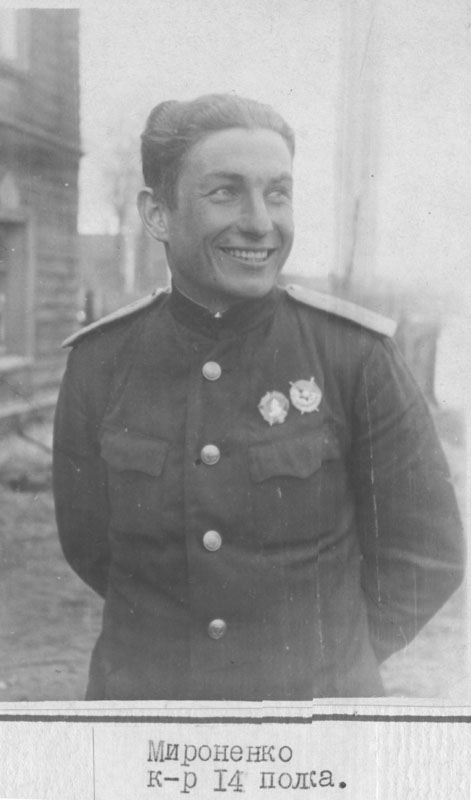
– Let’s return to SB training…
Deputy Commander of the school Regimental Commissar Prolygin arrived. War in
Poland was going all the way by now, newspapers wrote – "friendship
and help for Germany". And Regimental Commissar told us at the meeting:
– We have to study hard, to lift the fascist spider net on our red-starred
wing. No peace with Germany!
He told the truth. Then the 22nd June came…
I’ll remind you, that our school of naval pilots was the only military
school that Hitler mentioned in his speeches. He called it a “hornets
nest".
Our special services had caught one German female agent. She had a list of 138
people from our school with photos and characteristics. Hitler was right to
be afraid of us: Naval pilots were the first to bomb Berlin.
– What June 22 looked like? What happened then?
It was a rainy day. We were not flying; everybody was sitting in the tents…
Somebody had decided to have lessons in the tents. Only after dinner at Simonovka
airfield we were told about the war. Before that we read articles in the “Red
Star” (Soviet central military newspaper) about future air war by General-Lieutenant
Rychagov, Hero of Spain and China.
War. And everything changed instantly. Cadets were sent to the fields, to look
if somebody not local would appear. We began to drag airplanes around the airfield,
masking them with camouflage nets; we dug trenches under landing gear, so that
shadow would not give airplanes position out. Such measures, unluckily, were
common only for naval aviation. But nothing like this was done in the Army aviation
during first days of the war. Just think: During the first two weeks of the
war, Baltic Fleet aviation, which had 700 airplanes including 190 flying boats,
had not a single one damaged or destroyed by the enemy on the ground! How many
airplanes Army aviation lost in the first hours of the war at the airfields?!
1200-1400…
We were sitting in the corn with rifles, looking at the stars in the sky. When
some sound would reach us, we would think that it was a sound of the enemy airplane
armada. The mood was not good. Then, on the second or third day a fighter with
red stars had flown over the field with an unspeakable speed, very aerodynamic.
It flew at tree-top level, than again and disappeared in the sky. No one had
seen a plane with such a speed. It was a LaGG-3 fighter. Good plane, but heavy
on controls. Its production ended later; instead of it Yaks were put into production.
Those were great airplanes. La-5s were even better.
We began to flee from the Germans. Instructors flew on the planes, while we
travelled by train through Stalingrad. I was impressed how long this town was;
it stretched over 70 kilometers along Volga River. We crossed Volga, and went
north, towards Saratov. There forests had begun. And extreme poverty. At each
train stop there were 3-3 old women selling cucumbers, cole slaw. They were
all very sad.
We reached Samara airfield. Then it was Kuibyshev. There were aviation plants
in Samara. Sturmoviks were manufactured there. In Chapaevsk there was a huge
training center.
From there it was a railroad to Syzran. There was a train station Bezenchuk,
Simonov and Bezenchuk airfields.
A German plane flew over. It was a lot of noise. A lot of efforts expended to
dig cover.
Later battles near Moscow had begun and the temperature fell. Outside temperature
near Kuibyshev had fallen to -40 degrees Celsius. Guardsmen, who were guarding
airplanes, had to be changed every 20-30 minutes. Fur overcoat and flight gear,
fur lined pants, jacket, and hat. The frost was terrible.
There was one case. An airplane had landed at our airfield. With bombs under
it. What’s going on?! Our long-range bomber took off to bomb the enemy,
but got lost due to bad weather and ended up near Samara.
Our instructors were accomplishing special missions. Suddenly several SB airplanes
would fly away. Secret mission, no one knew anything. They would return 10-12
days later. Wind-bitten faces, it was clearly visible – they had to fly
a lot. Pilots told us, that they had to load rockets for Katyshas and carry
them to Stalingrad. They told us horrible things: they had to land on the fields,
where airplanes jumped on frozen dead bodies. They unloaded their cargo and
flew away.
The 7th squadron was organized, and we again were sent to Levanevskii School
– to prepare crews, so that a navigator and a pilot would fly in one crew.
Once I was making a usual flight, training in turns. Suddenly, another plane
approached me, waves its wings, showing "move away". There was no
radio. I understood nothing. Others also show me to get lost. I carefully moved
aside… Airplane that looked exactly like mine except for oval windows
flew past me. I landed, reported how it was. Do you know who it was? Voroshilov
came to command a parade in Kuibyshev! Stalin was in Moscow. It was also a parade
in Kuibyshev.
And how we confused foreign Ambassadors that assembled in Kuibyshev! At the
largest Simonovskii airfield all airplanes that could be found were assembled,
even UT-2 and R-10, that were about to be written off; SBs, almost 400 airplanes.
All were lined up. We had a task: take off, fly air parade over Samara, beyond
visual range we were supposed to change formation and fly over Samara again.
All was well coordinated.
Il-2 sturmoviks appeared later. They were produced nearby, in Samara. Part of
cadets was sent to train in them. In our 7th squadron there were 40 cadets.
At first we lived in tents. I was appointed as a senior (Starshina) of the group.
I had to walk my group to the airfield in full fur outfits for 7 kilometers.
At the front I placed two laziest guys: Boris, forgot his surname, and Leonid
Kapustin. Otherwise they would fall back and freeze.
Many things were happening there… For example, I’m sleeping. Somebody
is waking me:
– Comrade Starshina, maybe we should get up!
– Why? What’s happening?
– Tent next to ours is on fire.
Technicians’ tent was burning. They got a lot of coal, made a lot of heat.
As the coal was burning it formed sooth, an explosion went off. It blew up in
an instance. One technician was killed. He wanted to hide on the floor, but
suffocated to death.
Another miracle was when a full suitcase of money was found. There was a court
martial.
1942 was about to end. Strange thing happened: all pilots were graduated as
sergeants. Good soldier would go to platoon commander courses, and half a year
later he would become a lieutenant. We studied a full 3 year course. We completed
full course, in a bit less than 3 years.
I talked to the Army pilots. They sometimes had one training flight in Il, when
they were sent to the front. Before I got there, I got 24 training bomb runs
in Il-2.
– Before the war there was a slogan: "War on enemy’s territory with little blood". Now we were losing territory and people. How was the mood?
In Stalin’s school we thought that even if we are retreating now, we
will crush them later…
19 graduates from our VMAU were sent to the 35th regiment, which begun its combat
way from Kamenka airfield near Komendantskii Aerodrome on 22nd June 1943. When
this airfield was built, The Germans haven’t located it… Absolutely
unexpectedly for them a fully equipped regiment appeared on this airbase.
Instead of gunners we had navigators, who finished navigators’ school.
Pilots received a rank of Jr. Lieutenant, while gunners remained sergeants.
To be exact, pilots graduated as sergeants, but immediately after we arrived
to the front we received officer’s rank. Gunners remained with the rank
they received after graduation. Some gunners did not receive any rank at all.
For example, Petr Repin died at a rank of senior seaman. He made an excellent
photo. There you could see German Ju-88s burning on the ground... He made it
from the air… {10}
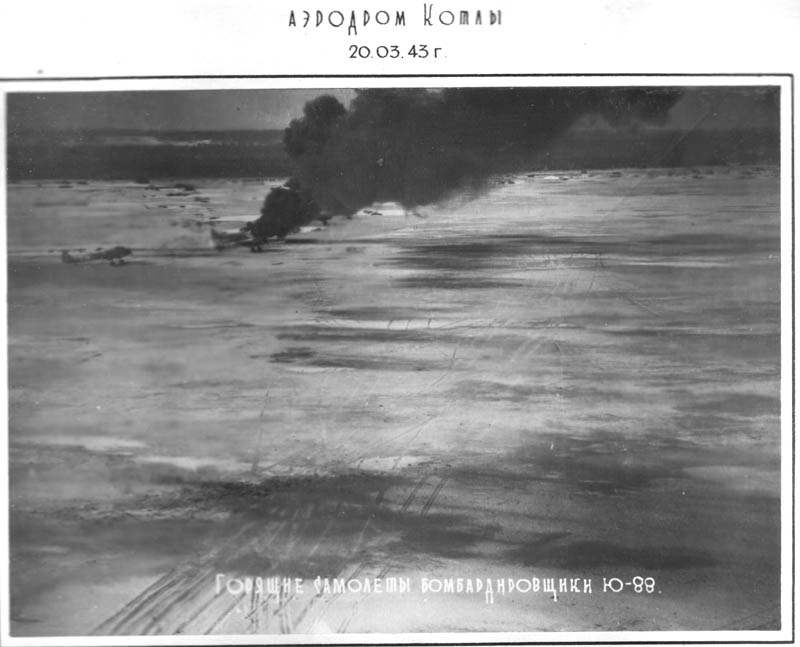
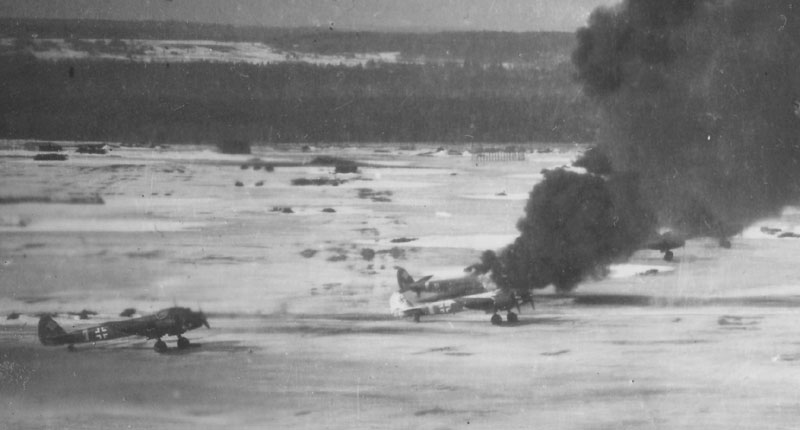
This photo made to all major newspapers of Soviet Union. Group was lead by major
Hrolenko, the 7th GvSHAP commander. During that mission our sturmoviks shot
down one enemy airplane on take-off. Petr had no idea how good the photo was.
He perished a few missions later. As a Senior Seaman… Not even a sergeant.
He was born in Red Holm, that’s in Kalininskaya Oblast.
Right before we begun actively participate in fighting, squadron commanders
came to the regiment. Our commander was Captain Potapov. In an army outfit,
he had a Red Banner and Patriotic War Orders. There were no shoulder boards
yet, we got them later.
Suddenly, an order came for a combat sortie. Six or eight planes took off under
command of Captain Potapov and headed towards Leningrad.
Boys came back, I knew them all from the flight school, so I asked them:
— So, how does war look like? Did they shoot at you?
And the guys are mumbling something with confusion. No precise answer. Well,
they don't talk, so be it. But it felt strange.
We transferred to Kamenka airfield. Here we were given naval uniform and shoulder
boards. We were also issued TT pistols. Someone shot to the ground from TT,
he didn't know how to use it properly. Later there were similar cases with personal
weapons…
Here we found out that they flew to strafe Gorodets airfield, where according
to partisan data a lot of German attack planes were gathered, perhaps, a strike
against Leningrad was planned. But there were marshes nearby, and mist had formed
over general area, so they couldn’t locate the airfield. That’s
why they didn’t tell us anything. The partisans were offended. They risked
their lives looking after this airfield while gathering reconnaissance information.
Then there was a court martial. Captain was found not guilty; perhaps it was
taken into consideration that there was a mist. Maybe he had something else
behind, because he was relieved of command and sent to Black Sea Fleet as a
pilot, where he later perished. {11}
On June 22 the regiment began flying combat missions. Groups with several airplanes
in each flew to attack Sinyavino Heights. There, eight or ten kilometers south
of Ladoga Lake, were artillery positions, almost without any camouflage.
The leader was Senior Lieutenant Stratilov. I was the last in formation. I flew,
but the engine worked poorly, and I started to lose speed. Neva River was getting
close, on the other bank were Germans. At this time I already couldn’t
see the airplanes from my group. Speed kept falling, I could feel that aircraft
is about to fall. I went down, there, near Berngardovka, was an airfield Priutino.
Just after gunpowder warehouses I turned, speed was just above evolutionary,
and I could have spinned easily. The Airfield was just a wooden strip on a swamp.
I approached, extended landing gear, but I couldn’t correct glide path,
there was not enough speed. I had experience, I flew a lot. I had 24 bomb run
practice flights, plus shooting at ground target practice flights. Army pilots
were told how a bomb should be aimed and dropped, maybe they made a single training
flight and that was it — "Out to the front! » It was completely
different story in naval aviation; no one in the 35th regiment would let you
into the sea until you learned enough. What’s the point to fly to the
sea if you don’t know how to aim?
And here I ran out of luck. I landed on wheels but am drifting from the strip
to the swamp. What should I do? I retracted landing gear and skid on the belly
to the bushes. I hit the bushes, hit some pole with the wing. I exit the plane
and engaged in negotiation with some commanders. I was taken as a passenger
in a Po-2 to Kamenskii airfield, where I received a new plane and an order to
fly another sortie. Our commanders were experienced, and knew that if a pilot
is left with his grim thoughts after a misfortune, he might lose confidence.
He should be sent to the air as soon as possible.
The crew chief Ivan Kharlamov was standing at the plane. I, in distress, take
my boots off and give them to him.
— Take them!
I took off with another group in dirty socks, and I was the last in formation
once again. Pilots dove and fired rockets, cannons and machine guns at artillery
sites. Explosions… everything was on fire. There was a lot of FLACK around
us… Each pass we dropped one bomb… Four bombs. Third pass, fourth…
All guns empty…
We returned to base. Ivan Kharlamov stands near the plane and holds my boots.
I noticed a group of officers going towards me. In front I saw from a distance
(my eye sight was good then, not like now) a tall naval officer in a large hat.
I realized it was the Fleet Commander Tribuz. A bit behind him was Mikhail Ivanovich
Samokhin, commander of Baltic Fleet Aviation. They came to me, and I reported:
— Comrade Commander, Junior Lieutenant Batievskii accomplished the mission.
Weapons and airplane worked fine.
Commander shook my hand and said:
— Comrade Junior Lieutenant, I congratulate you with accomplishing a mission.
I wish you to fly and fight a lot, and have less of this.
He pointed at something behind my back. He turned around and marched away from
me. I turned towards my airplane, and saw that stars on both wings were with
holes about 15 centimeters each.
During the second mission we drop one bomb on each pass again. Four passes,
four attacks. After return I saw new holes in the wing stars. After the third
mission I brought only one hole in the star. For the first 19 sorties I had
approximately 35 passes.
Commander Samokhin was told about my forced landing, that the pilot almost blew
up in the plane: leafs and bush branches hit the detonator of RS, if they hit
just a bit harder, there would be an explosion. After that he issued an order
that before attempting forced landing a pilot should drop bombs and rockets
to a safe place, for example, into the marshes.
— Who flew reconaissance missions in your regiment?
I can tell you a story, which I heard from Lidia Ivanovna Shulaikina {12}.
She was a sturmovik pilot. She made 30 anti-shipping strikes. Those 30 flights
were equal to 300 “night witches” missions they flew in a Po-2 at
night, crossed front line, dropped a bomb and returned. Hanged another bomb,
again flew 30 kilometers. Those girls were fantastic. They made over 700 sorties
each. They really were fantastic. But they were not equal to 30 missions of
Lida Shulaikina.
Germans also had a female navy pilot. She flew in a four-engine flying boat,
which was shot down. This flying boat sits on the bottom of the Northern Sea
for dozens of years. It is cold there, so it almost didn’t suffer from
rust. I saw similar flying boat in one of the fights. It came to collect their
downed pilots from the sea.
My pilot Petr Miroshnichenko was shot up, he flew by my side and showed that
he has no fuel left. He had no fuel even to turn towards shore line, he landed
on water. I clearly saw his red life vest and inflatable boat. After I came
home, I said:
— Let me fly there, I’ll show to the rescue crew where he is …
But they replied:
— No, you go get ready for another mission. Another crew will fly to the
rescue in a flying boat.
Those bastards didn’t find him. He was very close to the shore. If I would
have flown with them, I would have located him. I’m very sorry that I
didn’t insist. I remember how he hit ships with bombs two times. Petr
Miroshnichenko. That's how it was. {13}
— I’m interested in photoreconnaissance. Who flew with photo cameras in your regiment? How they were picked? Or were they special crews?
No. Everybody flew with photo cameras. I also flew. In 35th regiment it was
a mess. One pilot had almost 100 photo recon missions. But there is not a single
photo in the 3rd squadron archive. A hundred missions and not a single photo!
In my opinion, cameras were placed incorrectly in the Il. If you want to make
a photo of a target you have to cover it by the nose of the airplane. The idea
was to make photo where the bomb will fall. But it was incorrect – you
made a photo of a place that will be hit only if there was no wind. You will
have a ship in the crosshair, but the bomb will deviate to the side. You will
have a photo of a target, but without a hit. No matter how many times you take
a picture, it will be useless anyways.
It was usually the last one in the formation who flew with the camera. I got
burnet on it. I decided to gain altitude a bit, to make a better photo. I saw
falling bombs, their explosions. I gained altitude, but speed dropped a bit,
AAA — «bam», and a large piece of my wing was torn away.
So, here we have: wing is full of holes that I could see the sea below, fragments
pearced my hand, I’m bleeding… I immediately got stunned, but somehow
managed to bring the plane to a horizontal flight… As Fedor Seleznev told
me later, my airplane at this moment was attacked by German fighter. Germans
were practicing this… «Good» tactics. If they saw a damaged
airplane, they would try to bring it down. It’s easier to shoot a damaged
plane than a fully operational one. It is more dangerous to attack combat worthy
machine. A burst from Messerschmitt hit me and I was wounded by fragments into
head, hands and legs. I still carry over twenty fragments in my body. I told
one doctor that I have numerous fragments in my body. He replied that this is
nothing. If it would penetrate my skull and hit some nerve, than it would count.
Well, you see what I mean.
My one eye couldn’t see — the fragment was sticking out of my eyebrow.
But I noticed that frontline was below me. I had speed, and I descended. There
were wires on the poles, I jumped over them, and saw a marsh, that looked like
a horizontal surface. I landed at this seemingly level surface but the airplane’s
tail section was caught in the bushes and was torned out. The rest of the airplane
got into a ditch. It looked like a horizontal surface, but it was a marsh covered
by water. Under its surface there was a huge crater. The engine smashed into
craters wall with such a force, that all cabin was deformed. The canopy would
not open. In such moments you do everything automatically: I thought that plane
is about to catch fire and blow up. I sporadically pushed my legs, but one of
them was wounded. I managed to escape through a little window.
After I got well I tried several times to repeat this move, but there was no
way to do it. But on another occasion when I also crashed and couldn’t
open the canopy, I got out of the plane through the little window again…
I got out, there should be pain in the wounded legs, but I did not feel it,
my head was spinning, there was severe weakness, it felt like I was going to
fall. My gunner Ivan came to me, his overalls was covered with blood —
he was wounded in the leg. He missed enemy fighters attack, didn’t even
fire at him. I trained him a lot, but he had a bad sight and wasn’t too
bright too. Ivan was holding me and here some scared soldiers appeared from
the bushes, helped me and carried me somewhere. The tent, where surgeons were
waiting for me, shook from mortar shells explosions. Germans were shelling the
tail of my airplane, which was about 50 meters away from the main wreck…
Medics undressed me:
— We are going to operate, do you understand? Drink a glass of vodka.
They gave me a glass of vodka, I drank it. They put a mask on me and as I was
falling asleep I heard them saying that such an Apollo had been damaged…
I weighted 55 kilograms with a height 175 centimeters. I woke up completely
bandaged. I could hardly understand where I am, who I am, and what happened
to me… There was someone on duty. I talked to him and he replied:
— Do not worry; we are going to evacuate you…
And the soldiers carried me across the swamp. Nearby was a Ladozhskii canal,
there was a boat. A Colonel in aviation uniform said:
— Do not worry, everything is fine, you are going to live, maybe you will
fly again...
And the boat departed. Later there was some railway freight cars, some train.
They brought me to the hospital and cheered me:
— We are going to treat you. Don’t worry.
Here I grabbed my pants, but my wallet was gone. There were no money there,
but a medal “for defense of Leningrad” and a large fragment that
in one of the previous flights flew into my cabin and struck the sole of my
boot. It was even hot then. I took it as a souvenir… Now it was gone with
a medal…
I was undergoing treatment. It was very painful when bandages were torn from
tissue. I was treated for over a month…
— Where was that hospital?
It was in the village Myslino, Novgorodskaya oblast, South-east of Leningrad.
As heavily wounded I was sent there… My gunner was sent to the hospital
in Leningrad.
My treatment was over. I had to go to the front, it was time to fight. It was
the beginning of autumn, it was getting cold. Upon discharge from the hospital
I received a soldiers overcoat, burnt and with holes from fragments or bullets.
I put it over my blouse, which was also pierced in the area of sleeves and shoulder
boards.
We came to Leningrad in a polutorka (GAZ-AA truck, 1.5 ton) at night, through
a marsh by a road built from wood trunks. Shells exploded sometimes… We
stopped:
— You must be a pilot. Rest there, but don’t try anything funny.
What they thought of as funny? I came into a warm room, there was a girl sleeping
there. Who was she? Where did she come from? The guys were watching how I would
react at this girl. Old guys, with mustache. Several times during night they
came in to look, and each time I woke up… In the morning we went to the
city.
At the doors of the building I came to I found a note: «Company of officers’
reserve of the Leningrad Front».
— Pilot, it’s your turn.
I went in.
— Give us your documents.
I gave them certificate that I was wounded and my pilot's license that I got
from the flight school. There was some other document, which I don’t remember.
A Colonel said:
— According to your report you flew 19 combat missions. We are in need
of such pilots. This is why tomorrow we are sending you to the Army regiment.
To the other regiment? In the Army, not the Navy? Even though in Leningrad,
but still… I exited the building, there was a sentry guard at the doors,
but he turned to the other side. I ran out of the door... Where should I run?
What I’m risking? No idea. I turned around the corner – it was a
patrol but also facing back and going in the opposite direction. I turned around
another corner. I flew a lot over Leningrad, so I had an idea where to go…
Here is another story. I was ordered to take a regiment adjutant and regiment
commissar in a Po-2 and fly to Priyutino. I boarded two huge males into the
Po-2 cockpit and took off. Suddenly, over Leningrad: "Pfff", and one
cylinder of the engine stopped working, I could clearly see it. There were 5
cylinders and I could see that one of the valves is not working. And airplane
begun to fall. This plane was not designed to carry two passengers. I flew right
over roof tops, and made it on the prayers.
It was some plane on the runway and there was no way for me to land. I begun
making an approach to the meadow, but there was a crowd standing. Why did they
stand there? I switched the engine off, propeller stopped and I rose from my
seat and shouted:
— Run away! Get out of here!
They looked at me and ran away. It appeared that regiment commanders airplane
was standing there nose up, an explosion had ripped a tail section from the
rest of the plane. A bomb stuck in the bomb bay. We hanged four AO-25 bombs
into each bomb bay. That gave 400 kilos of bomb load. Colonel Petrov flew a
mission with regiment navigator Konstantin Vinogradov, and one bomb got stuck.
He landed at that same Priyutino, where I almost blew up.
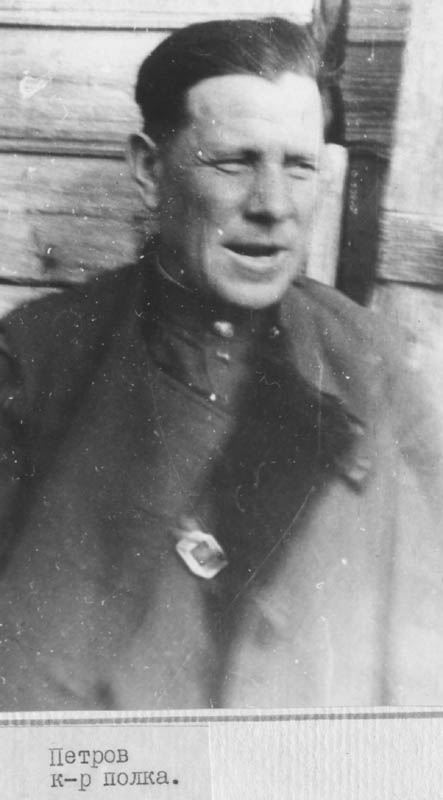
So, that’s why I had to bring adjutant and commissar here! The Commissar,
such a bastard, never even boarded a combat plane. But he was promoted to a
Major and even was awarded with some Order.
If you will ever be in Gatchina archive, look for the personnel files of Captain
Podstavkin, deputy commander of the 35th Regiment for political affairs and
Major Malovichok, who later assumed this position. Both were pilots who flew
a Po-2 before. Both files have such words:… "Extremely eager to fight
an enemy at our and their territory" — I tell it in my words —
"…currently studies airplane construction and weapons". But
none of them made a single flight… Think for yourself, he’s either
an idiot, since he couldn’t understand how an airplane works, or that’s
how he wanted to fight…
What happened on that runway was: on landing a bomb exploded. The Colonel didn’t
suffer as he had armored backrest behind him and armor around the cockpit, but
his gunner… His gunner for the mission was Captain Konstantin Vinogradov,
a handsome guy, who begun war duty in the Mine-Torpedo regiment. He already
had two Red Banner Orders. Two! His chest was pierced by two fragments. He was
sent to the hospital and I never saw him again. But I will always remember him.
He was a good lad, with a great sense of humor, which is grossly valued by pilots.
His jokes helped to keep the morale up. For example, as a regiment navigator
he had to test navigation readiness of all pilots. To pass the test you had
to know: area of flight, map, location and quality of the airfields, directions
from the high command. After checking our knowledge he asked main question:
— Comrade Junior Lieutenant, which qualities should naval pilots have?
Correct answer should be something like this:
— Main requirements for the naval aviator should be good night sleep,
wolf's appetite, total disgust to physical labor and partial to mental labor
too.
And we lost such a friend!
Our commissars haven’t flown a single mission. But Colonel Serbin, Baltic
Fleet aviation commissar, flew at night, right through our AAA shells explosions,
which fired at enemy bombers when they tried to bomb Kronstadt. He attacked
enemy planes caught by searchlights. He showed an example. Nor did he only fight
better than others, he came to our airfield Kerstovo in summer 1944. It was
hot, but we flew 2-3 times a day. There were no conditions for rest there, so
we had to arrange everything ourselves. Commissar of the Baltic Fleet Aviation
came to me and asked:
— You made a shower? Show it to me!
I showed him what we did: we installed a tank, painted it in black, installed
two grids to make showerheads and it was suitable for two people to take a shower.
He said:
— Very good example for everybody. I’m going to overfly other airfields,
so that they will make showers like yours.
And he flew himself. I’ve heard a lot of good things about him.
Let's get back to the story of my return after injury. The 35th regiment by this time was based at a Gora-Valday airfield, which was located near Gora-Valday Lake, just a few kilometers away from Shepelev lighthouse. That’s Oranienbaum bridgehead. It was completely surrounded. There was another airfield there – Borki, near Lebyazhye village. The Germans knew its location. 7th Guards regiment was stationed there. Our regiment arrived to the bridgehead and the German were unable to locate it. Why? Because at winter, for example, after planes took off, fur-trees were dragged on a sleigh to the runway. They looked like a dispersed forest. Once planes would return, trees would be dragged to the sides, planes landed; trees were placed back on the runway. It was a forest once again.
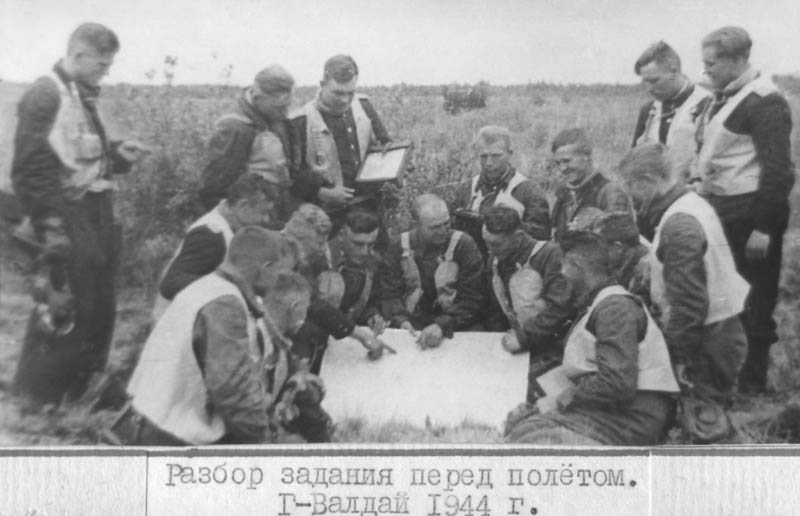
Preflight briefing, Gora-Valdai AB, 1944. Note yellow life jackets. Eeach plane had a LAS-1 inflatable boat too under the pilot's seat.
— At Gora-Valday Lake the 44th squadron equipped with MBR-2 was based.
Absolutely correct.
— Did you see it there?
No.
— A veteran, who was in a sentry company of the 44th squadron told us that this lake during winter was used as an airfield for U-2 female squadron. Have you heard anything about it?
U-2? No. Haven’t heard. There was another interesting thing. There used
to be a forward HQ of Baltic Fleet Aviation. Near the airfield, closer to the
lake…
I came back to the regiment and the boys greeted me, because I was the regiment’s
veteran who fought from the first days of the regiment’s active service.
By this time my first wingman, little Kuznetsov had perished.{14} I remember,
we were given a task to fly a two-ship formation to Sinyavinskie heights. I
took off as a leader; we came home, landed at Gora-Valday. His airplane was
torn by AAA shell fragments, while there was not a single hole in my plane…
I asked:
— You flew with me? How come your plane is torn by fragments, while mine
is untouched?
He was almost crying:
— You flew above thin cloud layer, I saw your shadow over me, but was
afraid to fly in the clouds.
He flew lower. Thus he was clearly visible - a perfect target.
Time passed. I once returned from a mission to the home base. My friends met
me, and gave me a letter that came to my late wingman Kuznetsov. His brother
wrote: «Dear brother, I’m proud of you. Excuse me if you can, do
you remember, we were playing chess and begun fist-fighting…» and
so on…
You know, I burst in tears, I felt so sorry for Kuznetsov. That’s how
strange it was, strange, strange…
— You didn’t tell us how you made it to the regiment after the hospital. If I remember correctly to get to Oranienbaum you had to get to Kronstadt first, then by ship to the bridgehead.
Not necessarily. I was taken there by “corn hopper” (U-2). When
it landed and I got out, everybody shouted:
— Hurray! You are alive!...
But I was telling how I escaped from the “Company of Officers’ Reserve”…
I flew above town, and generally knew where Grazhdanka airfield was. At Grazhdanka
there was some aviation HQ and the 12th Dive-bomber regiment was stationed there.
I walked around all patrols, gray overcoat camouflaged me, and everything was
quiet. I came to this HQ, a door opens and a Captain walked out, that same one
who greeted me in the personnel department. He looked pale and kahectic now.
And he remembered me. I told him what happened to me.
— We thought that you are killed. Take a stamp for food and rush to the
canteen because it’s about to close. Have something to eat and then we
will talk.
I was really hungry, almost complete day without food. I ate and returned to
him.
— Listen; there is a truck about to depart to Berngardovka-Priyutino.
There is a sanitarium for wounded, stay there for a couple of weeks. Go on…
The truck arrived; he stopped it and asked to drop me off at Berngardovka. It
was that same Priyutino, where I almost crashed and where the regiment commander’s
aircraft blew up. When I came, there were dances in the club. The music was
like this: somebody was playing a violin and trumpet, while drums went «boom-boom-boom,
troom-boom-boom…» I said:
— What’s that?
— That’s tango “Kotka”.
Over Kotka port there was heavy AAA fire. «Boom-boom-boom» resembled
shell explosions… We danced there. There I met that same Fedor Seleznev,
who didn’t notice how I was attacked, there were guys from the mine-torpedo
regiment. But there were very few fighter pilots. There also was a gunner from
our regiment, his body was full of shell fragments — Vassiliy Pesozkii.
I met him after the war. He became a school director…
After that I made it to my home regiment and to our new airbase. Then the liberation
of Leningrad began.
January 14th 1944. Misty morning. Then, suddenly, a fierce artillery fire commenced.
Traces of huge, 12 inch shells were seen in the sky — artillery bombardment
from Forts and ships. When large caliber shell flew you could see an inversion
trail after it, sometimes you even saw how it flew and rotated.
During the first days it was a blizzard. We were told that only our Division
flew from all aviation. I might be exaggerating, maybe I do not know who else
flew, but it looked like this. We haven’t seen anyone in the air.
From January 14th we begun flying, on 15th, 16th, 17th and 18th we kept flying
combat missions.
But right before this a strange thing happened. Right before the operation begun,
our regiment commander disappeared. He wasn’t shot down or something,
he was transferred to a new place… New regiment commander arrived —
Dasha Ibragimovich Akaev, who was just promoted to the rank of a Major. Who
and why kept him in the reserve till this moment is still not clear to me. But
that was none of my business. He was walking around the airfield, getting to
know the regimental affairs and so on.
— I’m going to fly combat mission. You will be my wingman.
You ask why he chose me? I already had 19 sorties, knew how to fly… We
took off.
Oranienbaum bridgehead is very small. I thought that he is going to either gain
altitude or try to pass the frontline at low level. Battlefront was visible,
because both sides used fir tree branches as a cover, two green lines 400 meters
apart were clearly seen on the white snow. But the leader kept flying steadily
at an altitude of 400 meters — best altitude for the enemy to aim at us.
I flew behind him, wading the tail of my airplane. I clearly saw his gunner,
I knew him.
Not long before I landed at Borki airfield, the girls found out that I was from
the 35th regiment and told me:
— Our Captain Trohachev was transferred to your regiment. He is quite
short, he usually puts a pillow under parachute to see more. Can you pass this
pillow to him?
Regiment engineer came to me, as if nothing happened between us yesterday, and
said:
— During the night we repaired your airplane, landing gear is fixed, and
the wheel was not properly tightened. You also burned machine guns bores. We
changed the bores and set the convergence. A German fighter is flying above,
so you have to wait. Twenty minutes later you will have a chance to take off.
Cheers!
I must have burnt bores when I fired at enemy columns. As I pressed the trigger,
I didn’t release it until the end. But our machine guns fired 30 rounds
per second. I said:
— Good.
Regiment engineer liked to be in charged. He commanded as he pleased even after
the war.
But the day before I landed on one wheel, and even drew my pistol at this engineer
from the 7th Guards Regiment. Somebody from behind grabbed the pistol and took
it away from me. It was a senior engineer of the VVS Baltic Fleet Colonel Gurevich,
he later became a General. I called him not long time ago, he lives in Moscow.
Congratulated him with festivities, thanked him for saving me from penal company
or prison. If I would have hit him, I would be court martialed. He was a Captain
while I was Junior Lieutenant.
— But could you describe more precisely what happened?
It happened on January 18th 1944 when I received an order to seek out and attack
in two ship formation by any enemy means of transportation on the road Volosovo-Narva.
After we took off I got separated from my wingman due to heavy snowstorm. Trying
to locate him I opened canopy, so it froze in the open position. What’s
worse – I was unable to find my wingman. To make situation completely
awful I found out that the right undercarriage leg is not working and sticks
out into the wind stream. Still, there was no other option for me but to try
and accomplish the mission. So I flew at airspeed of 320 km\h, with an outside
temperature - 18°?. Snow easily filled my cockpit, ice covered the instrument
panel and I couldn’t feel my legs anymore. To be able to fly I had to
clear most important gauges by fingers. This all seriously distracted me from
keeping situational awareness at appropriate level.
When I noticed first trucks it was already too late to attack. I begun turning
to set an attack pattern, but first trucks had disappeared under the trees.
I even became upset – the target escaped! But then I flew out of the clouds,
and in front of me I found a long snake of infantry column. It was a gift from
God!
Infantry was not covered by AAA, soldiers had to fight strong wind blowing them
into the faces, so they were not looking at the sky, and that same wind did
not allow them to hear my engine. I simply pressed the trigger and saw blue
traces disappearing in the column. When first soldiers disappeared under the
nose of my Il I released bombs. That time my bomb bays were loaded with 16 AO-25
fragmentation bombs with a delay set for 5 seconds. I kept firing, but there
was no end to this mass of infantry, so I fired all eight RSs. By this time
I flew as low as tops of telegraph poles. I had to abort the attack.
When I begun gaining altitude with a turn, my engine begun stalling, from the
sides I could see the traces of awakened small caliber AAA.
With great caution I piloted my airplane by the shortest route to our airfield.
The good point – my engine seemed to begin recovering, it sounded more
and more stable, the bad one – German small caliber traces were getting
closer and closer. As I got to the home base it was clear that there was no
way for me to land on Gora-Valday – the right leg did not lock, so I would
get dragged from the runway right into other planes parked along narrow airfield.
Borki had a round appearance, so I had more freedom trying to land there. With
lots of luck I landed safely. I tried to stand up, but couldn’t. Then
I noticed some hands searching through the cockpit, and someone said:
— You idiot! You forgot to lower landing gear as emergency procedure says.
You crippled the plane!
I wanted to say that airframe is not so seriously damaged, but then I suddenly
was engulfed by undeserved insult.
I took out my TT pistol, and tried to hit the source of the voice. Somebody
grabbed my hand and took away my pistol. I was escorted to the HQ. There I ripped
off the face mole mask. Usually it protected our faces from frost, but this
time it froze to my skin, so I took the mask with bits of skin. I reported to
the 7th regiment commander Major Karasev that I attacked the infantry column,
that AAA cover lagged 800 meters behind, and that the weather was getting better.
The Major asked me to show on the map where I caught the Germans, and ordered
to prepare 9 Ils for the mission. Meanwhile somebody called the doctor, he checked
me out, but there was nothing but mortal tiredness and little frostbites. The
regiment commander ordered me to go to the canteen and then to rest.
In the canteen girls gave me 100 grams of vodka with pepper as a medicine against
flu. As I ate, Ivan Bezhanov, a pilot I knew, told me that their engineer was
not too keen on trying to send me to the court martial.
When two girls guided me to the dug-out, where I was supposed to have some rest,
they brought me to the newly-formed crater. As a passing by seaman described:
— In this crater you can see all that remained from the German ace. Some
time ago four FW-190 tried to strafe the airfield. An ace from the 14th Guards
fighter regiment Konstantin Kovalev shot two of them down. One fell right there.
In the crater I saw man’s “device” with no trace of the rest
of the body.
It was warm in the dug-out, but I was still shaking under heavy fur coat. Then
I got all sweaty. For a long time I was unconscious. I woke up from poking:
— Comrade Commander, the regiment engineer ordered to give this to you
as a present... We recovered it from the cowling of the engine and from the
wing of your plane.
However sleepy I was, I still understood that he showed me pieces of soldiers’
overcoat, belt and one German shoulder board. But I was too tired to think about
it and dozed off again.
In the morning I woke up as good as new. I carefully examined my “souvenirs”
in the daylight. After breakfast I was told that my plane was ready, examined
it and flew home. But I forgot the “souvenirs”.
While I was resting after the flight thinking of the «trophies»
that I left behind, I recalled events described in the brochure that I read
in the flight school before being assigned to the Baltic’s. This brochure
was about combat activities of the Black Sea aviation ground-attack pilot Captain
Suslin who arrived to our flight school and spearheaded forming of our regiment.
In Odessa area Suslin lowered his landing gear to pretend he is flying German
Ju-87 and strafed a column of Romanian infantry. It became clear that it was
Romanian infantry column only back at the airfield, where pieces of Romanian
uniforms, a helmet and a scalp with hair were recovered from the wheel wells!
At that time I did not believe that such an episode could be real. Any impact
of the wheel creates a strong roll-over moment and the plane would be drawn
to the ground. This is a 100% risk. But these bits were actually raised into
the air by explosions of RSs, through which my plane flew.
Now we are flying with Akaev with a task to strafe Klopitsy airfield. He flies
at an altitude of 400 meters in a straight line. It was shocking but I maneuvered
to avoid the AAA explosions...
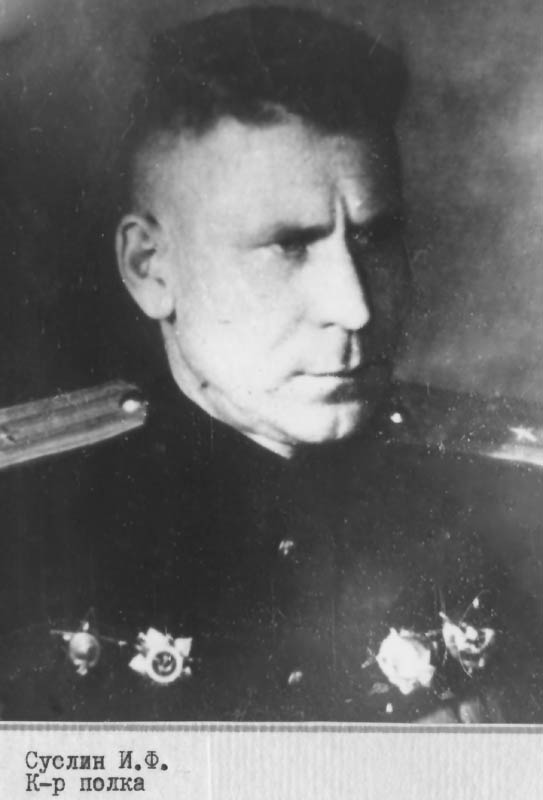
— Did you fly in pair?
Yes. There were no intense strikes at that time. Visibility was poor, shells
exploded. I saw a lake south of Oranienbaum bridgehead, that’s a landmark,
near there were Klopitsy. Klopitsy was one of 5 K’s: Klopitsy, Koporye,
Kummolovo, Kerstovo, and Kotly.
He flew, crossed the frontline, and begun gaining altitude. I followed him.
He reached Klopitsy. The road was rolled in the snow, it was sparkling and you
could see everything. The AAA fired at us. But my leader didn’t see it.
I saw explosions but he didn’t.
I noticed that the road lead to snow piles that looked like camouflaged airplanes.
I aimed there, fired, and observed that the snow moved and some airplanes clearly
became visible. My leader must have seen them, but he kept flying above in circles,
while the Germans kept firing at us with their automatic cannons. I couldn’t
understand what he was doing. He didn’t guide me to the AAA sites, so
I couldn’t fire at them because I couldn’t leave him alone. If I
would attack, the regiment commander could be far away. So I followed him. I
dove down and then gained altitude back. Meanwhile he kept firing who knows
where. We returned to the base, landed and I came to report.
— Comrade Major, combat mission accomplished, weapons and airplane worked
fine.
— Good boy, we showed them! We showed them good!
What the hell! Here comes the Major, Chief of Staff who fought from the start
of the war as a navigator. The regiment commander did not allow me to leave,
so I had to stay by his side. Two technicians came:
— Comrade Major, your airplane’s engine was hit by AAA shell.
Dasha Ibragimovich Akaev looked at them.
— What shell?
He went pale. I stand near him – he forgot to allow me to leave. He lacked
military discipline. I followed him. The shell hit his airplane right into the
engine, but very luckily. Idiots are lucky. It hit right into the spot where
two pieces of armor overlap, that is, armor there was twice as thick. Two centimeters
to the sides, and the engine would be smashed to pieces. Oil would pour out
of the engine, and he would have to stay on the other side of the frontline.
They brought him a glass of vodka, he emptied it and left. I never flew with
him again.
— Could you tell us about unsuccessful strike against Rakkvere?
It was a black day for the regiment. What happened over Rakkvere I do not know
– I did not take off. On take off a propeller blade dismantled.
On February 26th Akaev lead a group to strafe the airfield. No one came back,
but Petr Maksyuta…
Airfield Koporye. Snow was falling. There were no bulldozers, and a tractor
dragged rail tracks to level the snow so that we could take off. The regiment
commander Akaev decided to lead the formation personally... All regiment commanding
officers were there.
Major Kashtankin, who just arrived to the regiment and was appointed as a ground
control officer almost got me killed. We begun taking off. As a flight commander
I was leading the last pair. I gave full throttle, but the engine had no power,
it shook severely. There was not enough runway length, and even worse –
at the end of the runway there was a snow pile. The ground control officer commanded
me to take off.
I turned around for second attempt. No luck this time too. My gunner told me
that a part of his machine gun fell off from heavy vibration.
During the fourth attempt the ground control officer still commanded to take
off!
He was slapping on his pistol and showing me his fist. He was a pilot, and he
must have heard that engine was shaking. But he just arrived to the front, he
wanted to prove his worthiness. "Take off". That was his attitude
towards me.
Maybe he was a good man, somewhere, somehow. But I insulted him a day before.
I test flew the plane, but one wheel did not extend. I maneuvered, flew high
Gs, tried to release it with an emergency winch — 27,5 rotations. Nothing
helped. So I landed on one wheel. I did it before. I always landed perfectly.
Switched engine off, shut off fuel lines. Airplane banked after landing…
Then, suddenly, somebody gets into the cockpit without my permission and fiddles
with landing gear controls. He might have done something with controls, and
then I’ll have no proof that I did everything right. He had no rights
to do so! Of course, I chased him away. I didn’t know that he was appointed
as a deputy regiment commander. I was a Lieutenant, he was a Major, but I still
chased him away. How could he get into the cockpit without pilot's permission!
— What are you doing here?
He was silently breathing. I chased him away and he rolled down the wing. It
appeared he was newly appointed deputy regiment commander for flying. He just
arrive a day or two before from the Far East. I did not know who he was but
who the hell he was to get inside and mess with the cockpit. There would be
no problem if an engineer would look into the cockpit.
And he did not forget this and being a flight control officer he is threatening
me with a pistol! I was ready to take off, even though I knew that I could hit
the snow pile, rockets may explode, I can overturn. Fuel line may get ruptured
and fuel may ignite. I clearly imagine all these scenarios… Kashtankin
slams on his pistol and yells. Then, right in front of an airplane the regiment
engineer Mikhail Milentyev appeared. He graduated from the Aviation Institute;
he got a higher education, an experienced engineer. He said to me:
— Press brakes and throttle up.
The engine is revving. I throttled, he showed me a “cross” and “taxi
to parking”. He’s an engineer, he orders me and I understand that
it is dangerous. I began to understand, that that fool got insulted for what
happened the day before. The day before, not a month. It was still fresh. Up
until 1944 he sat at Far East…
I taxi, the engine is vibrating heavily, but works. The propeller is spinning.
They were arguing when I looked back. Mikhail Milentyev shows something to him.
Kashtankin swore at us:
— What have you done? He must be in the air now…
I left the cockpit with my helm on and without disconnecting my communication
cable. And at this moment I heard over radio… I’m not making it
up, I would never even think about something so stupid. I heard Akaev saying:
— Forward to the West, not a step to the East!
Eight or six airplanes flew. I can’t remember exactly now…
Meanwhile I got off the plane and walked to the propeller. One propeller blade
was loose, hanging. I took it in my hands, made three and a half revolutions,
and it got separated... aluminum blade was not heavy, I put it on the ground,
sat on it, and smoked a cigarette. So I sat… My wingman also made four
attempts to take off. He had a normal engine, but he played chicken… That’s
how it was.
There was a scandal, commanders and political department understood that a pilot
could have perished on take-off. Major Kashtankin was transferred to the 7th
GvShAP, where on an anti-shipping strike mission he was shot down and rammed
into the enemy ship. He was awarded HSU posthumously. That’s life, there
are no saints among us and everybody had their shortcomings.
Back to the story of Rakkvere airfield strike. Situation was euphoric, everyone
was happy. We just successfully deblocked Leningrad, we felt like we could do
anything now. That’s my opinion.
A couple of hours previously six planes flew there under command of my friend
Petr Maksyuta, but they returned. They all returned. The weather was bad: heavy
clouds despite winter. They couldn’t make it through those clouds to the
Rakkvere airfield. There were 40 new FWs based at Rakkvere, their pilots were
mostly graduates from Berlin School of Air Snipers.
They intercepted our second group, I’ve been told that all fighters were
in the air and expected our Ils.
Akaev took Squadron commander Major Reutov on his wing. They took off, but only
Maksyuta came back. No one else returned. Regiment leadership was all gone.
I’ve been told later that Major Reutov survived. And Vladimir, a Georgian,
flight commander, forgot his surname now, returned from the POW camp. I met
with him, we sat at my apartment in Moscow, he almost cried when he recalled
how he was captured, how they ran in snow, how Estonian fascists were chasing
them. The navigator tried to shoot them with pistol, but what is that pistol…
They shot the navigator. Vladimir was captured in some barn. He was crying when
he told me this story. We wrote letters to each other later.
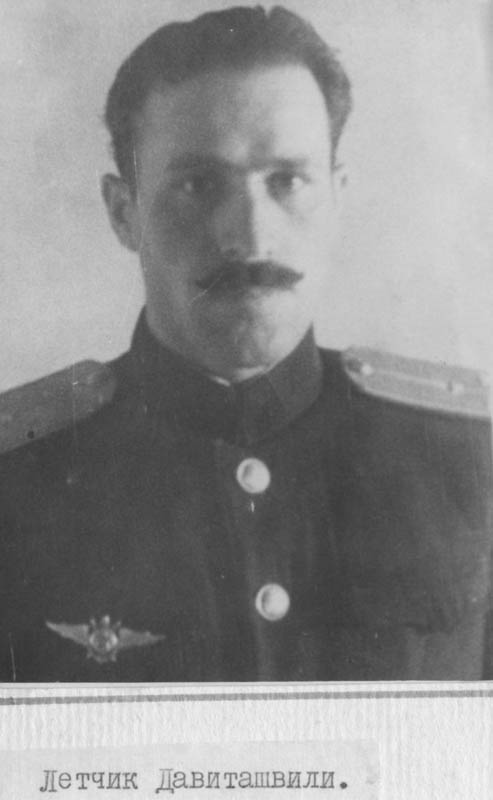 pilot Vladimir Davitashvili
pilot Vladimir Davitashvili
But it is unknown how the fight was going on. It’s my opinion, but I’m
not an eye witness that clouds didn’t allow gunners and pilots to protect
each other. The Germans were over their airfield…
I’m not sure, if the squadron commander Balitskii’s Jewish crew
returned. He was an older man with grey hair and he did not look like a Jew.
Later, when they returned from the POW camp, they told us how they managed to
fool the Germans:
— I’m Russian, can’t you see that my nose, it is ponting up.
— And who are you?
— Can’t you see that I have an Armenian nose — I’m Armenian.
They got away with this. {16}
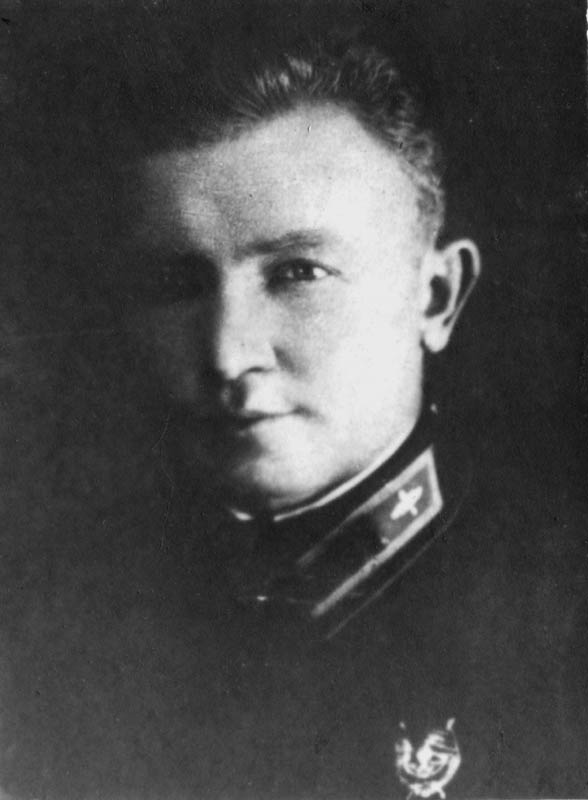 Kashtankin
Kashtankin
— We came to breaching of blockade with you. What was next?
Then war continued. We moved to Koporye. We walked to the fortress, looked
at its thick walls, huge round tower. Germans left a lot of traces — empty
bottles, garbage, crap… we walked and looked, when one pilot, older then
me, approached:
— Are you Batya?
I said:
— Yes.
— Listen, I’ve been appointed as first squadron commander, —
the previous one had perished. Would you like to be my deputy?
— Why not, yes, I would like. What I should do?
— I’m going to the HQ now to report that you are my deputy. You
should accept new pilots instead of me. Six or seven pilots came from the Far
East. Junior Lieutenants, all graduates from Bataisk, you will find them. Show
them their trunks.
I came and the guys are standing in overcoats, hats, naval uniform with boots.
All had suitcases. I said:
— Listen, boys. Congratulations with arrival to the frontline, and wish
you success. You will be in our squadron. Now to the business. Squadron commander
Senior Lieutenant Tretyakov ordered me to billet you in housing for flight personnel.
Let’s go. Comrade Lieutenant, lead your team.
Lieutenant — young boy with blue eyes, short. We entered the room.
— Three days ago this trunk was occupied by Senior Lieutenant, flight
commander. Now it’s empty. Now you, please. You will be next to the window.
Its owner used to be flight navigator, he perished three days ago.
I mentioned all who were killed this way… Tretyakov came:
— What have you done? You frightened them! I hoped you will do it right.
At first I felt uncomfortable, but then it passed…
Tretyakov said:
— You are good at naval tactics, I’m not, and I used to be a civilian
pilot. — I think he was pretending that he was not that good. Tell them
about force comparison. Something about your own experience. About your first,
second and third missions. How you fly up there. Go on, execute.
That was his order. So I told them everything my commander asked about.
— …I made a mistake, I flew behind main formation with a camera,
tried to gain altitude, lost speed, while I should have maneuvered. You always
have extra speed, guys. My speed was only 270 kilometers per hour. Economic.
I should have flown faster if a fighter would approach from behind. If you will
fly too fast, you will overrun all other airplanes. Thus you have to maneuver
and increase intervals. Then you will always have speed and possibility to joint
tighter formation. Remember my grieve experience…
It happened that Tretyakov stood behind me:
— Fine, well done. Keep up good work.
In a day or two we already flew combat missions to the open sea. There still
was ice floating, but mine laying ships there, we knew them by the form of the
stern. I flew and lost two in one flight. They landed on ice and before my eyes
sunk. Flights were going on, but commanders preserved me for some mission. Meanwhile
young pilots that came from the Pacific had to fly. They flew out, came back,
that blue eyed one reports to me:
— Comrade Lieutenant, I report. A German fighter appeared in front of
me, I pressed a trigger of 37 mm cannons and it fell apart…
— Great, comrade Lieutenant, I congratulate you. You will tell everybody
how it happened during debriefing.
That’s what I told him. He was so happy, his eyes were shining. But at
this same moment I thought that I did something wrong. It’s nonsense.
Who gave a young pilot such a heavy airplane? It was difficult to fly it, 320
kilograms of extra weight…{17}
Being a deputy squadron commander was a new thing to me, commander sent me everywhere,
check this and that, inspect new planes, and call the engineer. And he kept
placing more and more at my shoulders…
A few days later this young pilot perished in this airplane with heavy cannons.
I forgot his name now, but he was the only child of a famous, highly decorated
pilot, who shot down many enemy planes during WWI. After the First World War
ended he stayed in France, where Russia bought new planes.
— Minaev?
No, I forgot his name. But I hope that I will recall it, because I read a book
about him, named «Broken Sky». This pilot brought his group to the
south, entered Denikin’s Army, and on first occasion flew to the Reds.
Fought near Tsaritsyno, then formed a group from the remains of the old airplanes,
hanged bombs, and destroyed an airfield near Voronezh that was controlled by
Denikin. Then he did the same to the second Denikin’s airfield.
That boy was his son. I didn’t know it then, I found it all when I sat
at the Lenin’s Library.
In the 35th regiment a son of famous pilot Babushkin, after whom a metro station
was named, also perished. He crashed at Kerstovo airfield.
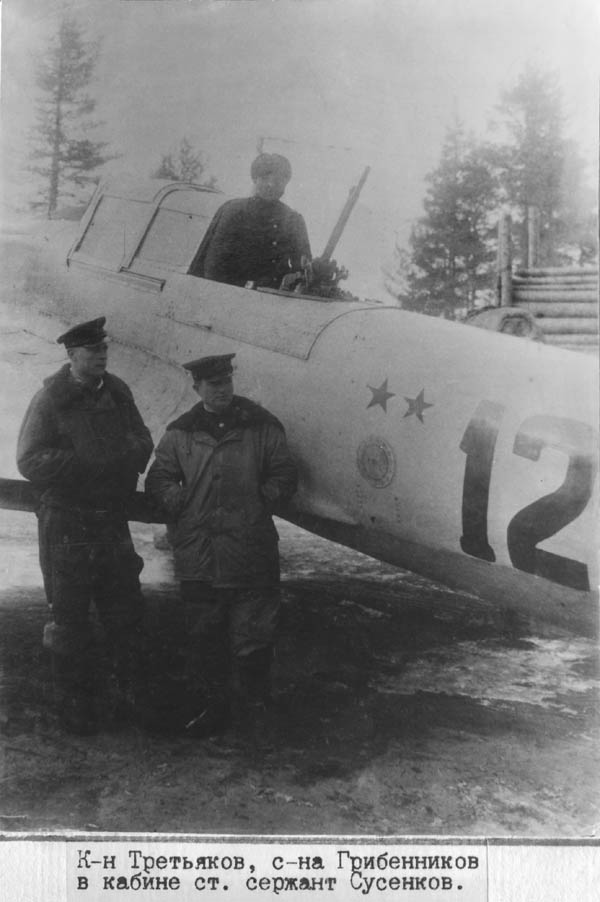
— Here is a photo: Captain Tretyakov, Starshina Grebennikov, Senior Sergeant Susenkov in a cockpit, Il-2 No 12 with two stars on the fuselage. Most likely gunners’ kill-marks.
Susenkov was an airplane technician.
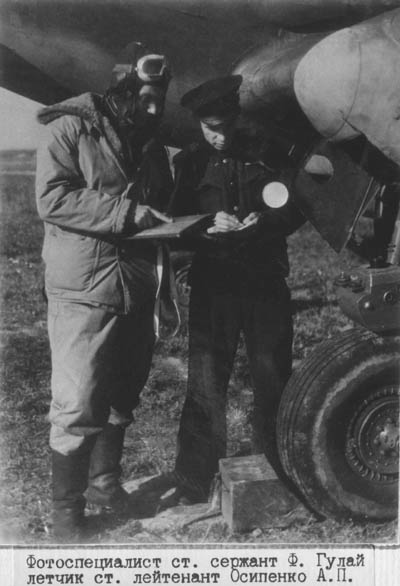
— Next one: photo specialist, Senior Sergeant Gulay, pilot Osipenko.
Senior Lieutenant Osipenko. Alexander Osipenko. He died over a year ago from cancer in Leningrad. He was a great pilot and great photographer. Several times he made pictures of me attacking. It is a very difficult thing to do. He flew 117 missions. He could be sent for the highest award of the Hero of the Soviet Union.
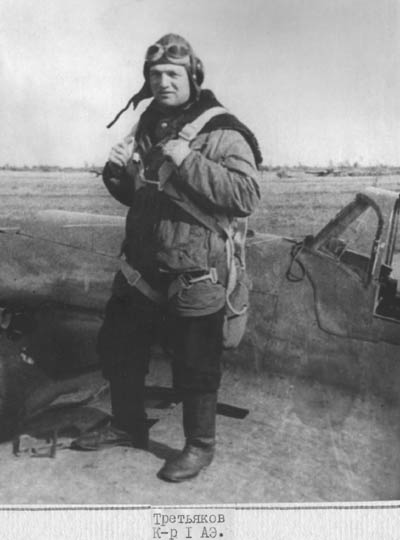
— Tretyakov on a wing of Il-2.
Yes, I know it. With a parachute. I remember it.
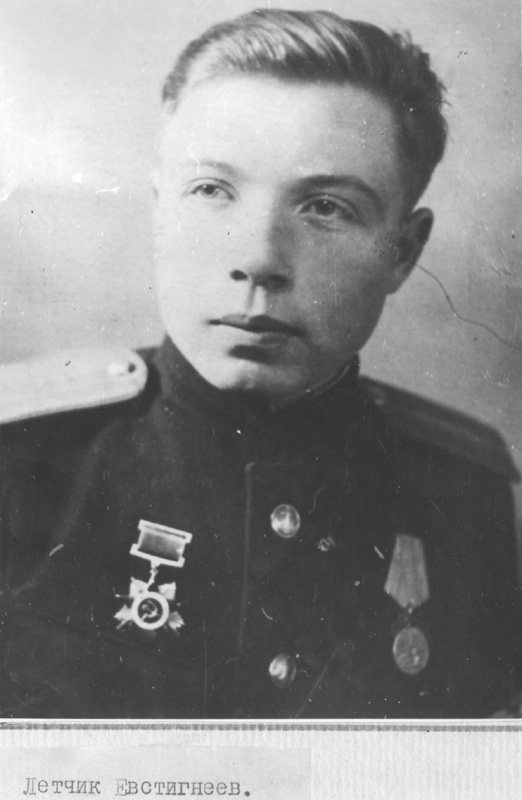 —
Pilot Yevstigneev.
—
Pilot Yevstigneev.
Alexandr Yevstigneev… He perished with my gunner, Vladimir. You know how? They took off in a blizzard and young wingman collided with them. They all fell together. {18}
— photo: regiment commanders at Bogoslovo village.
Here are all regiment commanders. There were two images and I am on one of them.
— Kapitan Ageenko. You said he was the 2nd squadron commander?
He was the 2nd squadron commander, but for some reason a weapons technician from our squadron was accused in incorrect handling of bombs. What happened really, who did something incorrect is still unknown…
— Ageenko perished because…
During one of the missions a bomb exploded. Either pilot didn’t know
that it had an instant fuse, or he mistakenly flew too low. But how such an
experienced pilot could make a mistake?
He is already with shoulder boards on this photo, a Captain. Order of the Red
Star and two Orders of the Red Banner. Ageenko also received an order of Alexander
Nevskii…
Do you know what Delta F is? Delta is known from math formula, in algebra. For
example, in navigation this is an adjustment. In life it happens that you need
to make an adjustment for a fool. Memory can also be mistaken. In your records
there are errors in last names but I know for sure that this is Vasiliy Spirov,
not Spirin.
— Vasiliy Spirov…
Because I know his wife and son, I buried him in Tsarskoe Selo. We will find this case with the help of Raisa Yakovlevna, the typist. We will find the files that I know. I am already blind, you know.
— What can you say about Il-2 with 37mm cannons?
It looks like our factories started producing Ils with 37mm cannons a bit later,
and that’s why they made it in a haste. These cannon could pierce most
vulnerable spot in the Tiger, Panther and Ferdinand armor. Those super heavy
tank creatures. This spot was above the engine and behind the turret with armor
40 mm thick. If you fired from above where the engine was, 37mm shells could
penetrate the armor and damage the engine. Exactly what was needed?
But if it was developed earlier, it could be placed on fighters. Fighters received
it later. They were on jet fighters MiG-15 and MiG-17 during Korean War. That’s
1950s. But a fighter had one such cannon.
Sturmoviks received these cannons before the Battle of Kursk. It was important
that they were synchronized to each other. I flew to test these new weapons.
Noticed enemy ships, my pilots were flying behind me. I’m a leader, I
fired and they followed. The plane even stopped in the air, I was swinging,
pressed against the chair. Good. But there was another variant, when canons
did not fire simultaneously…
— Novitskii Yevgenii said about 37mm cannons that because of them there were several catastrophes — wing broke off.
That’s what I tell you – unbalanced airplane. What’s it,
if not a future catastrophe? If the burst was short it was normal. But when
it was a long one, the cords would loosen up and cannons will fire not simultaneously.
I used to have a photo, where there is no airplane visible, but a piece of an
island covered by shell explosions, clearly cannons were firing not synchronously
— in such cases the airframe experienced such loads that they could rip
a plane apart.
I know who perished in such a crash. He was not from the 35th, but from the
7th regiment. I believe he wasn’t a simple pilot too…
But to be simpler I would advise to fire in short bursts only. {19}
— Let’s move on. What happened later?
Later? All the same — war! In the summer 1944 war was mostly going on
at the southern shore of the Gulf of Finland, where we fought against groups
of small ships. Between Narva and Tallinn there was a port Kunda. We strafed
it. Here is Narva River and here is Narva Gulf… Here is Merikula, where
our assault troops perished. The Germans guarded this place, there was a minefield
there, to be sure that our forces won’t make it to the shore. No one knew
about it, even though pilots passed their information. I saw how they mined
there, I lost two men there.
During summer we still bombed them, that was a task given by our high command.
Our intellectuals and smart heads tried to deceive their intellectuals and smart
heads. But we had nothing to do with these games. Our business was to strafe.
Day after day, day after day. Dive bombers bombed once or twice, and they never
flew there again.
We were common guests in Merikula and often bombed it. And I almost got killed
there, almost made a mistake. The regiment commander… I must tell you
about the 35th regiment commander Kuzmin Vasiliy Petrovich… Does this
name tell you anything?
This name didn’t tell anything to Fleet Commander Admiral Tribuz too.
He didn’t mention him a single time in his memoir book «Baltic Warriors
Fighting», even thought he mentioned me 3 times. He didn’t mention
the former commissar of the 7th guards’ regiment, the regiment commander
Vasiliy Petrovich Kuzmin a single time. There must have been something between
them.
Kuzmin flew as zampolit to Finnish fiords during first months of war. He described
tricks of finding boats there. He even wrote a manuscript. I read it. He said:
— I want to fight. I want to lead a squadron to battle. And to write papers
and publish propaganda material - someone else can do it without me.
He was transferred with demotion as a squadron commander to the 7th Guards regiment.
He led them to battle. Then he was transferred from the 7th regiment to a position
of the 35th regiment commander.
He liked to fly with our first squadron, where Tretyakov was a commander, and
I was his deputy. He liked to fly with us. Once he took me as his wingman and
lead entire regiment — almost 30 airplanes. I flew to the left from him.
He led us to small ships, but I noticed large merchant ships near the shore…
I called over radio:
— Lets go there. Where are you going…?
And “untranslatable” further on… But he kept flying as mission
order prescribed. We all followed him. He dove, I dove. We shot after him and
dropped bombs. Turned around and flew along shoreline. We flew past large merchants
that I noticed before attacking the small ones. I got frightened and thought:
my God, what could I have done, if the commander would decide to follow my guide.
Germans pulled empty merchants to the shore. Waterline was as high as 5-7 meters,
that is, they were empty, and they almost dragged them to the beach. And about
100-150 meters away under the bushes were dozens of AAA guns, waiting for us
to attack. God, what could have happened if I lead the whole regiment to this
trap… Commander didn’t say a word. And he didn’t say a word
during debriefing…
Right at the wake of the 1945 New Year eve I walked at the street of Leningrad,
and met a driver of Regiment Commander Lt. Col. Kuzmin. By this time Kuzmin
was transferred to the 11th Division as a commander of the 8th Guards regiment.
When the war at Black Sea was over, this division was transferred to the Baltic
Fleet. His driver was flying as his gunner. On the ground he was a driver but
flew missions as a gunner. He replied:
— Commander is here, let’s go and meet New Year together.
I was on vacation, and had a full suitcase of large apples with me. Kuzmin’s
wife met me, we knew each other, because she worked as a librarian at Kerstovo
airfield. Commander met me:
— Hello!
We celebrated the New Year. They started to bring food to Leningrad, it was
no famine already. I saw mandarins, couple of vases with grapes, and they put
my apples there too. We are sitting, toasting Victory. Vasiliy Petrovich was
sitting on a couch and I was standing next to him. He said:
— Listen, do you think that I do not know who swore at me over radio then?
That’s a scandal! Almost a simple pilot barking at the regiment commander…
— I know that it was you.
He didn’t do anything then, but some rumors must have appeared. He continued:
— Don’t worry that your nomination for the Hero of the Soviet Union
was denied. They will send it again and you will get it, don't worry.
It happened that not only my nomination was called off, but Nikolay Nikitin’s
as well. He got into fistfight with somebody. The reason for me was more complicated.
The commissar Malovichko, the same one who never flew a single mission, called
it off. He made it silently, without explaining the reason. That was our commissar.
He pulled it all off when the regiment commander was transferred to the 8th
regiment.
We flew more than once with Kuzmin. On the northern side of Chudskoye Lake there
is a village Ranapulgeria. We flew and noticed a small ship smoking below. We
dove at it but Kuzmin made it very carefully:
— Stop, something isn’t right here.
We gained altitude, made another circle. Usually ships went through the middle
of the lake, but this one was near the shore. Then we noticed AAA guns nearby.
It was, in fact a trap – a raft was made from logs and they put a barrel
with oil and ignited it, so it was smoking. A trap! He saw it and I saw. And
we went to the middle of the lake – there were more than enough real targets
there.
Another trap we met at the Riga Gulf. There was a burnt-out German merchant,
which was of no use to anybody. We didn’t understand it in time and hit
it with rockets, ripped all superstructures off. That was a decoy target. And
we bought it.
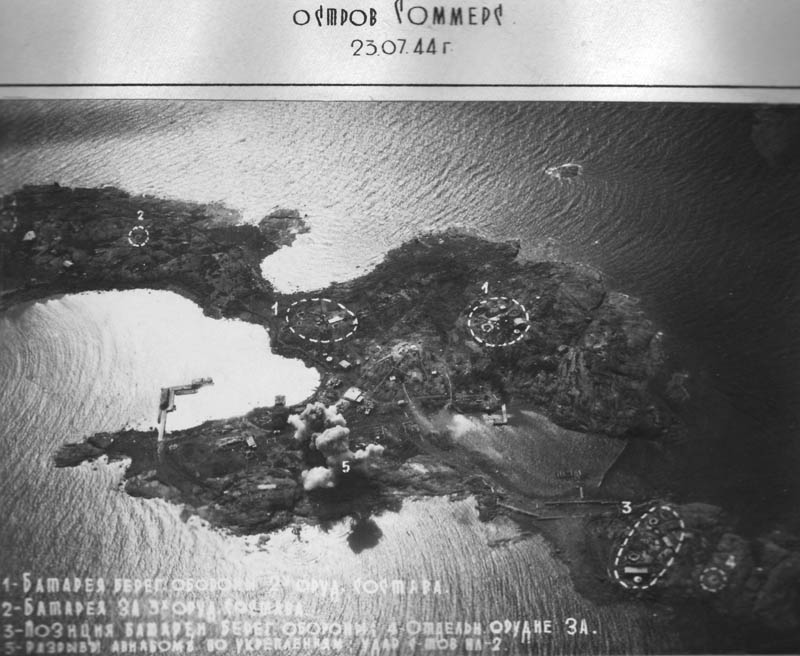
An attack on Islands Sommers on 23.07.1944
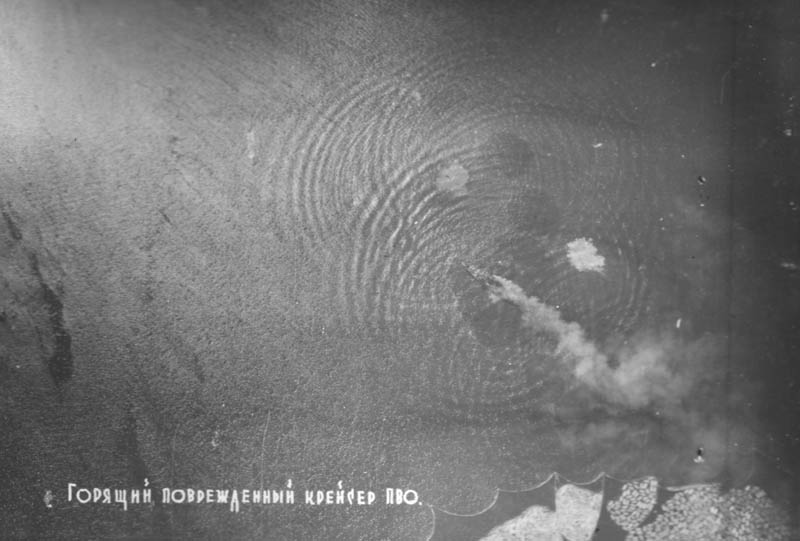
Kotka port, burning AAA cruiser 10.07.44-1
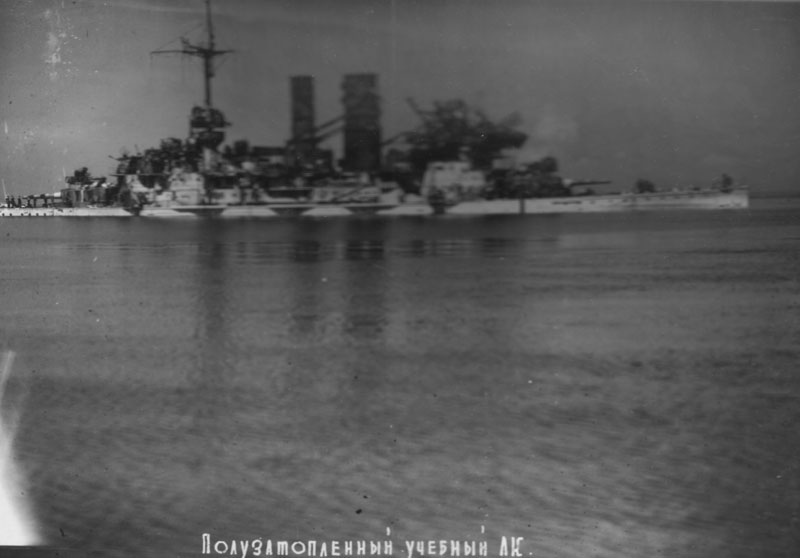
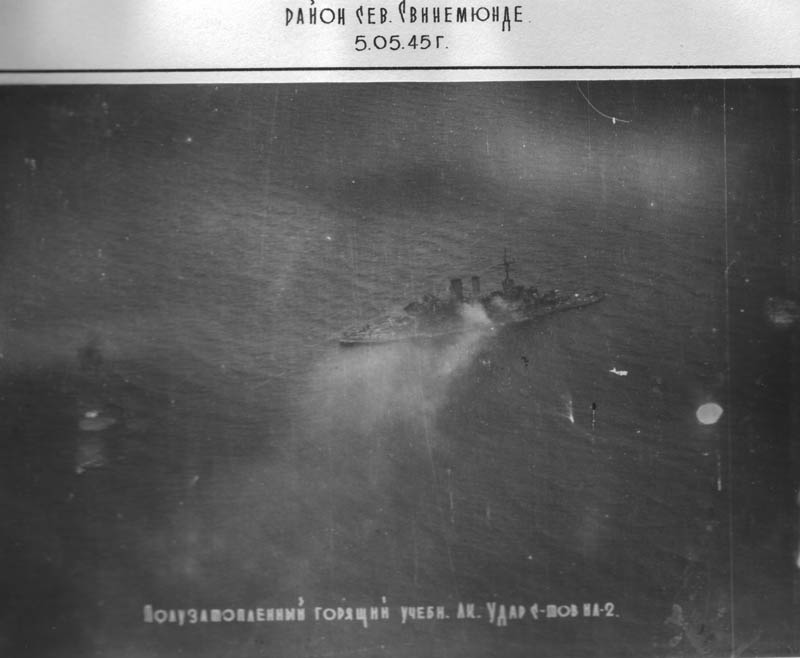
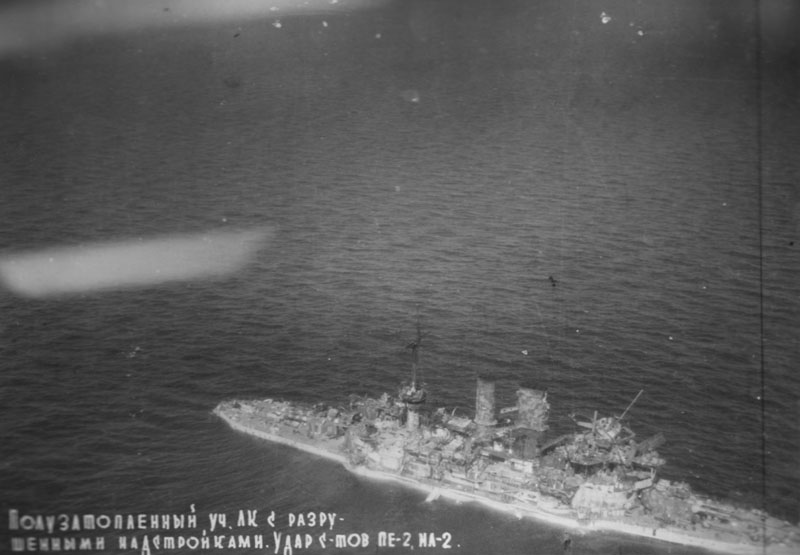
3 photos: Semisunk practice cruiser at Svinemunde area after strike by Il-2s and Pe-2s on 5-05-45
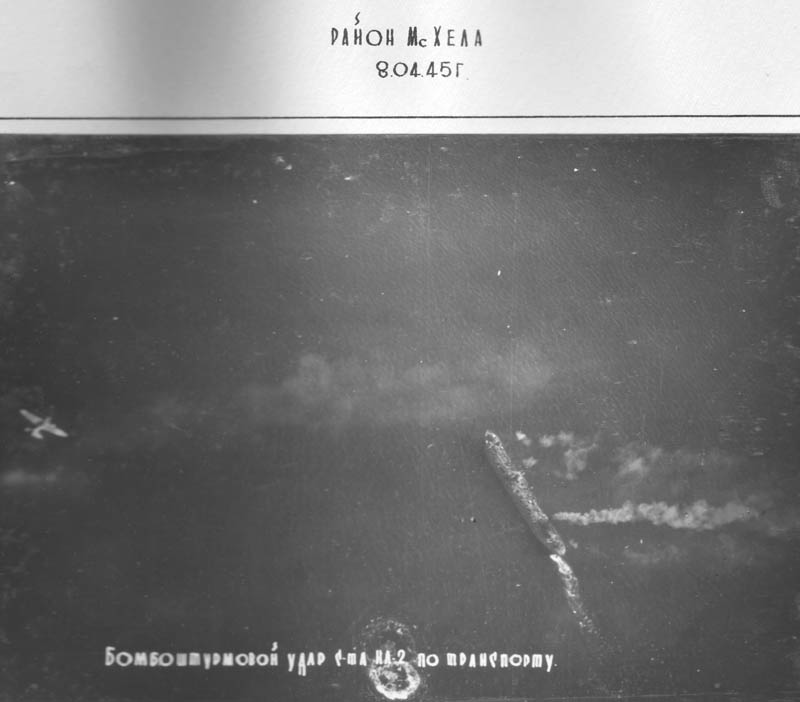
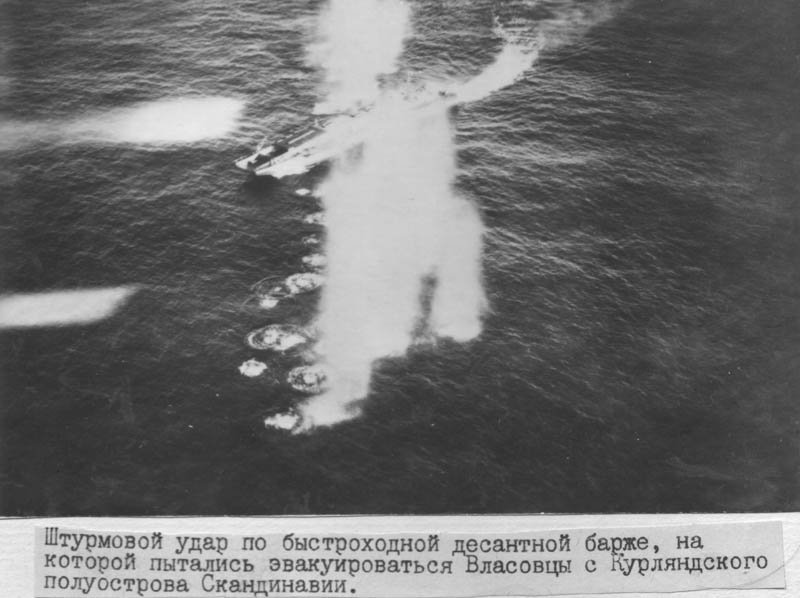
Strike against descent barge carrying ROA soldiers escaping Kurland
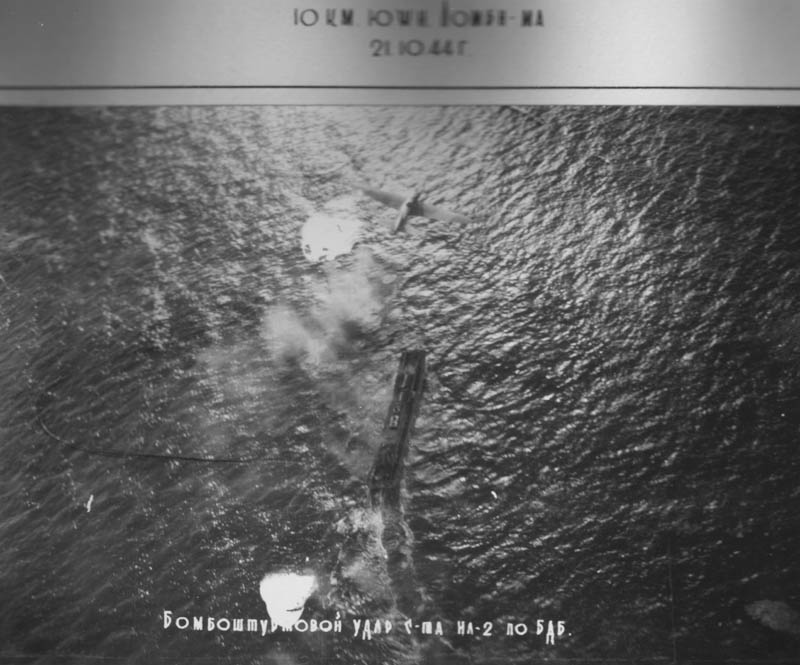
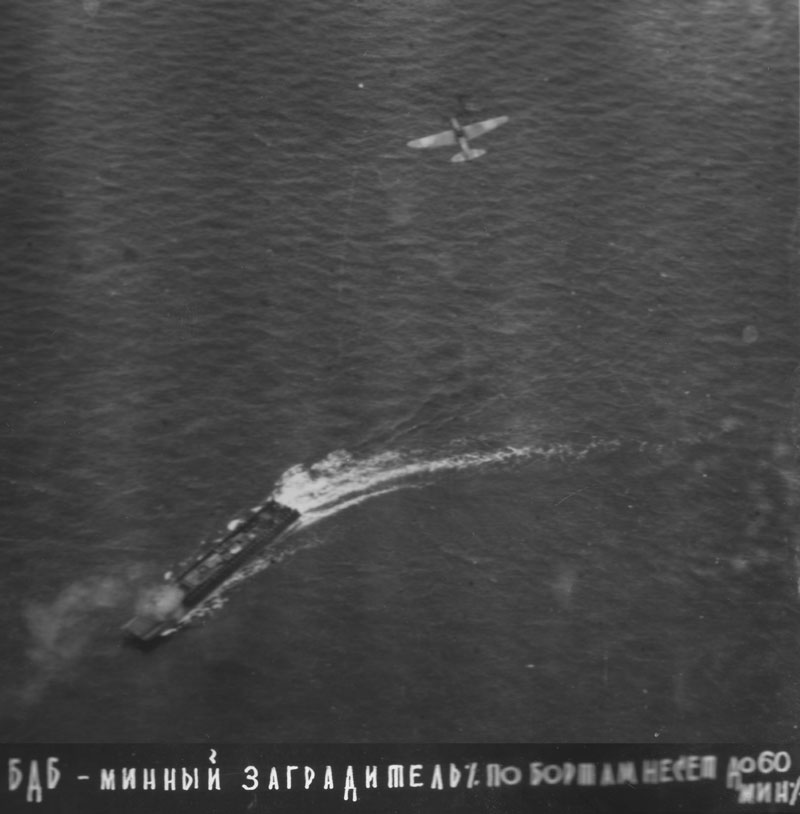
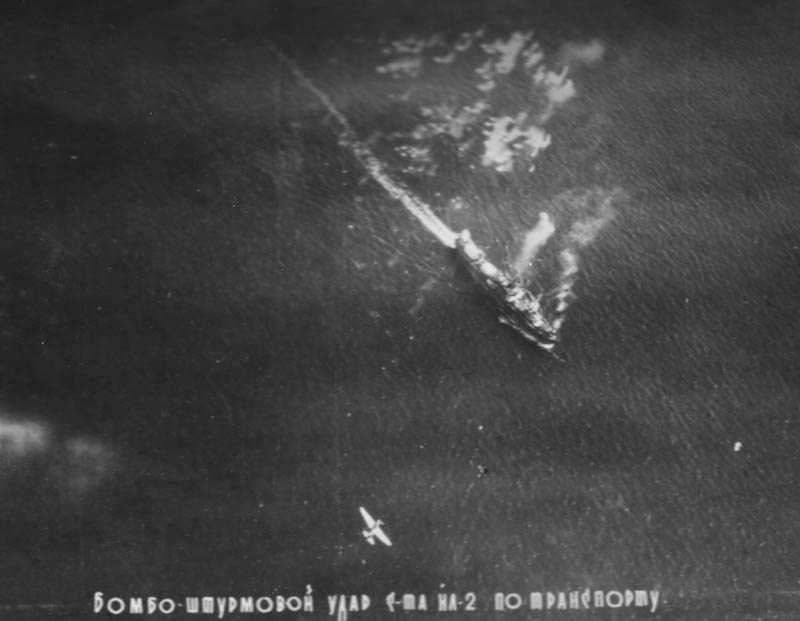
Striking a merchant ship in the Hela area on 8.04.45
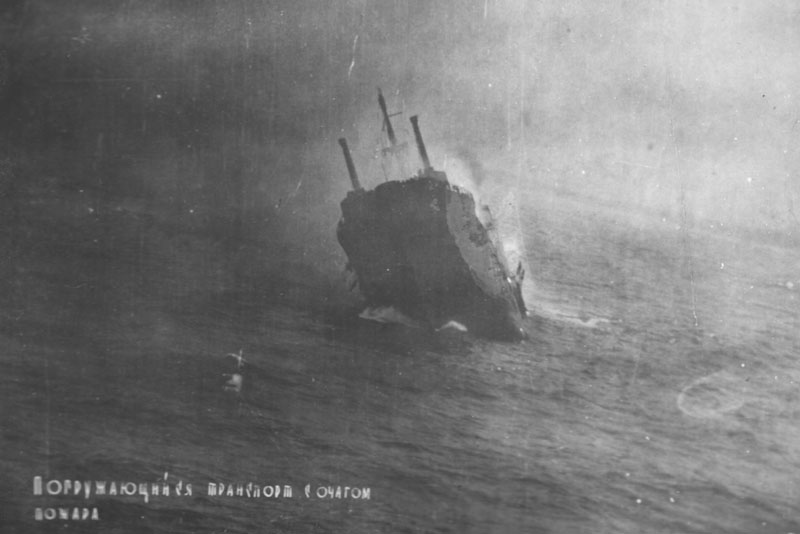
A merchant ship going down
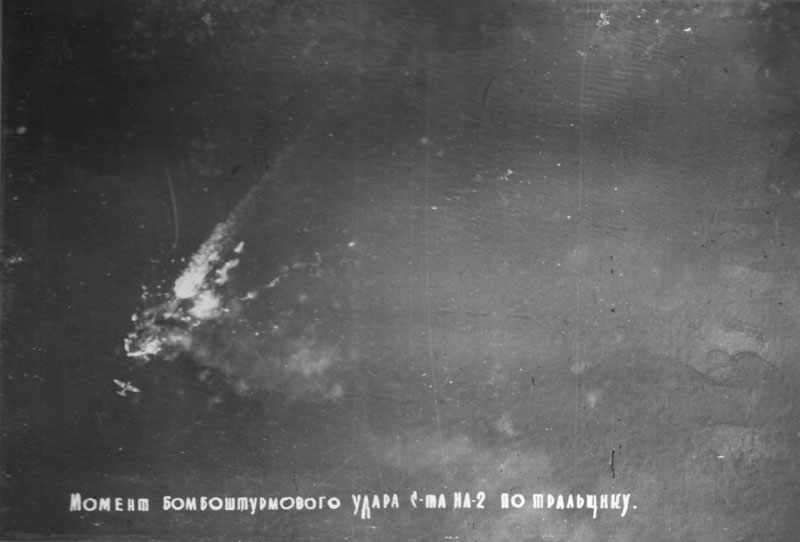
Attack against a trawler
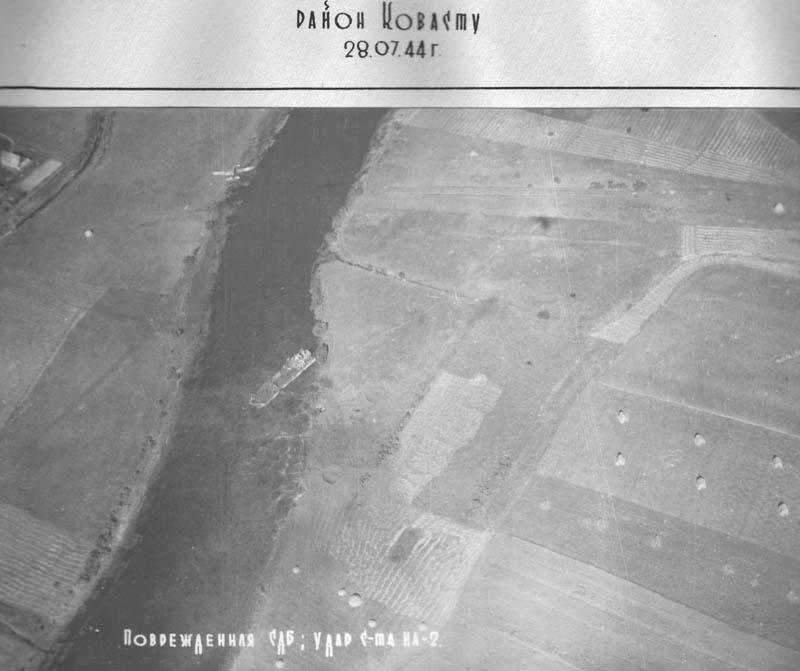
Kovastu area, Il-2 damages a descent barge on 28-07-44
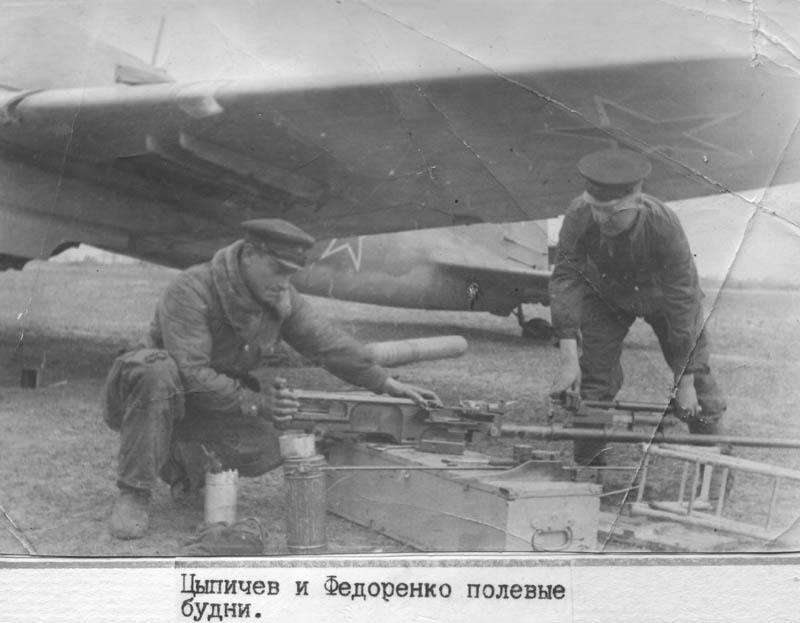
Tsypichev and Fedorenko preparing Il-2s armament for future fights
— You celebrated the New Year. Where your regiment was stationed then?
The regiment moved from Pyarnu airfield to Saaremaa Island, airfield Kogul, which was used by the 1st MTAP pilots to bomb Berlin in 1941.
— Did your regiment take part in fighting at Moonsund islands? That same Saaremaa?
Of course. We also strafed ships near Obruk Island. That’s a small island south of Saaremaa. Strafed them at Kihelkonna harbor…
— What can you tell about fighter cover?
At the beginning of the war, even up to 1943, there were very few flights with
cover. We flew in small groups and fighters flew in small groups, they had a
lot of problems with guarding Sturmoviks.
We got new planes in our division, the cover was performed with Yak-7b’s.
Later, by the end of war, at winter 1945 other fighters appeared — Yak-3,
but there were few of those. That was a light airplane and it was a highly maneuverable
machine that could easily outmaneuver German fighters. They mostly had heavy
Focke-Wulfs with great cannons. We also got fighters with air cooled engines.
Twin star La-5 and La-7. Later there were La-9, which had large fuel tanks and
there was a possibility to hang drop tanks to it. That was a totally new hardware.{20}
But apart from machines it is very important who flies them.
There were pilots who had no idea how to fight, there were pilots who got into
the air by accident. But mostly best men went to aviation, people ready to risk
their lives. Comrade Stalin Josef Vissarionovich said:
— Pilot is a concentrated will, character and readiness to risk.
A great pilot was Mikhail Avdeev.
— A lot is known about Avdeev. Avdeev and Grib were fighter pilots in VVS ChF.
I knew Grib, we used to study together. I flew with Avdeev in pair after the
war.
We received new sturmoviks Il-10. They arrived at the end of the war, somebody
even made several combat missions with them. But they were not successful, experienced
sturmovik pilots said that they were good planes, streamlined, it even had sound-proof
insulation and engine was more powerful, and everything was great, but bullets
somehow hit radiators more often then in the old Il-2. {21}
— That is, in your opinion Il-10 was worse then Il-2?
It wasn’t worse, but pilots said so…
By the way, Avdeev shot at the speed boat carrying Manstein, it was not known
before. Just recently this information became available. But he did not have
a right to do that as he flew a recon mission. In this case you have to follow
your rout and get back. It was lack of discipline on his side. He wanted to
see Yalta and could not stop himself.
— What do you remember about the strike at Haara-Laht on 12 or 14 September 1944?
We had no planned strike at Haara-Laht. I had flown there, but it was a secondary target.
— Tikhomirov told us that you were going in regimental strength, rather loose formation. You, the first squadron, than the second, and the third behind. And he told you to get closer to bombers in order to minimize the enemy’s time to react.
There were several such flights. It really happened in general area of Haara-Laht,
but a bit closer. In Haara-laht there was a turning point for the fighter cover.
Sturmoviks could fly 30-40 kilometers further. Fighters had less fuel, so we
didn’t fly there. There was one case when they shouted "Turn back…"
Those were the flights along southern coast of Gulf of Finland, by Estonia coast
towards Tallinn. Narva, then Kunda, then Merekula, and then Haara-Laht. We flew
there several times, the whole division flew, not just our regiment. When the
division flew, the 7th regiment went first, then our 35th. This practice was
utilized during summer of 1944. We had new planes. Fighter cover flew on Yak-7b
and there were La-5 nearby. But those were not cover; they were stationed at
Lavensaari Island and at Kuplya airfield. My squadron usually flew last. If
the Germans would chase us we would be the first under attack. That’s
why I gained about 500 meters of altitude higher then the main formation. Then
I saw that our friends commenced the attack, I gained speed and flew over the
coast. I was not going along the coast but going to the enemy’s territory
at an altitude and is difficult to hit me at such altitude. If I attack ships
from the coast I will gain speed and then I’ll end the attack run well
into the open sea. There was a hope that the Germans will not chase us there
– they didn’t like open water. That was my calculation. I did not
cover it up, everybody knew of my tactics. Many years later Engineer-Colonel
Vladimir Orlov stumbled across me on the street in Moskow:
— Hello, how are you?
— Fine, and you?
— I work in the Headquarters. Not long time ago we discussed your suggestion
about protecting bombers in bad weather conditions.
But I retired 3 years ago. And the clerks were still mumbling my suggestions
how to protect the bombers. I mastered bombers, torpedo bombers, jet fighters,
sturmoviks. I had ideas how to arrange their work together. Then I retired but
they just strated looking at my suggestions. That’s what Vladimir told
me. Then we returned to the war days and he said:
— Listen, do you remember how your last in formation almost collided with
my last in formation because you attacked with a different angle.
Yes, we almost collided… Poor Volodya, he passed away. He was a sturmovik
from the 7th regiment - smart, good boy. I studied with him at the officers
courses.
— Could you tell us what do you remember about attacking Finland?
I flew to Finland only twice. We flew out with Tretyakov, he lead me for the
first time. Tretyakov used to be a fighter pilot. He was very experienced, 9
or 10 years older than me. He came as a Senior Lieutenant, but later he became
a Captain. He got his first order. Do you understand? First mission! Being his
deputy, he took me as his wingman. We flew in pair. Took off from Gora-Valday
airfield, crossed the Gulf of Finland. Flew between Kronstadt and Shepelev lighthouse
towards Finland. To our right was Vyborg Archipelago islands. To the left –
the Gulf of Finland. There is a “nose”. At that nose as our reconnaissance
reported was a long-range artillery battery. Long-range artillery is a serious
thing, it can fire as far as 25 kilometers away…
Tretyakov came precisely to the target, but there was nothing difficult in it
– even a fool can do it. I suddenly noticed an airplane flying straight
at us and reported:
— Aircraft ahead!
And we immediately opened fire with cannons and machine guns, eight traces,
his and mine. This airplane went down and disappeared. This was a signal –
if they located us, only God knows what Finns could do with us.
We flew, attacked the battery from shallow dive. Then we turned around and drifted
towards the enemy territory. We turned, fired again. Spent all ammo… That
was my first strike at the Finnish territory.
Second strike was strange. I already was getting into ambulance Po-2 with pilot
Igor Ladnov. There was a covered cabin, where two passengers could sit. I didn’t
know this Po-2 pilot, but he always flew this plane. He was supposed to take
us to Komendantskii airfield in Leningrad from Gora-Valday. There we had a mission
to test-fly airplanes…
Why I chose Igor – he had relatives in Leningrad, we thought that we will
spend a night there, in the morning I will test-fly airplanes and by the evening
we would fly back to our field.
But we were told that the German aircraft were flying. This was Oranienbaum
bridgehead, Gora-Valday was a very dense place. We waited when a seaman came
to us:
— Comrade Lieutenant, you are called to the regiment HQ.
I came to the regiment HQ and they told me:
— Lead the 3rd squadron on a mission. There are no leaders now but you.
I hated such exprompts, seriously, I hated them. With whom would I fly? Who?
Who will be my deputy? I appointed Ivan Gavrilov as a deputy, I knew him a bit.
Some of other pilots I never saw before. We took off in six plane formation.
Somewhere between the islands there were four guard ships. And these guard ships
were not some boats, it was a serious business. And really, reconnaissance gave
correct information — four guard ships were going in keel water formation
between the islands. I led the group to attack them, the guys followed me shooting
at them. The gunner was also from their squadron. I demanded he would report
what the group is doing. Everything was fine, they followed me, they all attacked…
— You flew only two missions to Finland?
Yes, I believe two. But I could have forgotten. A lot of time had passed. Maybe three flights. There were several missions to islands of Vyborg Archipelago.
— Did you fly at Kotka or Turku?
No, I did not. Sturmoviks flew to Kotka only once in summer 1944 together with
dive- and torpedo bombers. Flew against "Vaynemaynen"… Sunk
"Niobe". That was Black Sea Division that just arrived to Baltic…
But let me end the story how I led the 3rd squadron. So I led that squadron
and they followed me. We attacked, turned around, to attempt a second run. I
noticed that one plane is not diving, but drops bombs from level flight, right
along those ships. I looked carefully, remembered this airplane tactical number.
Then we turned around to go home, when our fighter, Yak, dives right in front
of my nose. He goes down and begins to gain altitude again. Behind him was a
Focke-Wulf. It gets right into my gun sight.
When Yak left my gun sight, I slightly adjusted direction with rudder and gave
a long burst from about 100 meters. The German fell to the sea in pieces.
— Did you receive money for the downed fighter?
No.
— Why?
It’s interesting for me to answer your questions. Situation was difficult…
I lead a squadron where there was no leader, but there was total mess. I brought
the squadron home, everybody was safe and sound. I came to the parking area
to the pilots. I wanted to find out why one pilot did not dive, but flew over
ships and bombed from horizontal flight. I wanted to shake him:
— Why did you do it?
But it was no order there, noisy crowd. Somebody shouted:
— Hurray! We shot down! We sunk!
I was no longer a leader for them. They saw that enemy plane was shot down.
Everybody yelled: "We shot down". As if I had nothing to do with it,
that’s because I was not in their squadron.
No one reports to me, they all went to major Konkov, adjutant of their squadron.
He is recording something, they already forgot about me, even pushed me aside.
And here somebody is telling me that situation in the air is normal and I have
permission to fly to Leningrad.
I got to the airplane, we got to the Komendantskiy airfield, and we test-flew
two airplanes. Everything was fine. We reported. A technician approached me:
— Comrade Commander, — he couldn’t see shoulder boards under
the flight suit. — I looked around the hangar and found an old newspaper.
Maybe it will be interesting to you.
I unfolded this little newspaper. It had a title “The Baltic's Airman”.
I kept this newspaper. Then we went to Igor’s relatives, ate there –
we had our ration with us. Spent a night there. Leningrad was already deblocked.
Igor’s relatives told us how they lived in Leningrad, about different
miracles. They were crying. They all managed to survive.
— Was it because their relative-pilot could smuggle some food to the city?
No, not like this. When the war started somebody went to the shop and bought
a large box, meter by meter size, of caramel. Candy with some filling. They
all survived. I also remember they had a portrait of some relative – a
tank officer with the Order of Lenin. On the second day we flew the planes back
to our airfield…
Then Igor took my airplane without my permission, I was absent at the base at
that time, and he perished. No one was allowed to fly my plane without my permission.
But it happened that I had flu, and a doctor sent me back to the barracks, to
have some rest…
— Was your airplane different from an ordinary Il-2?
It was not too different. Ils from last series differed from the first ones.
They had arrowed wing.
It was not camouflaged; it was silvery, without any paint, all metal. {22}
— How did you aim with bombs?
I looked through documents in the archive. At the beginning of the war Marshall
Laktionov issued a directive "Seven ways to aim". And all were crap.
We did not even manage to learn how to aim and the war started. The airplane
was designed with armor, eight rockets under wings - a true battery. Cannons,
machine guns. New collimator sight was placed, it was idiotic, useless. And
do you think we hit the target? Smart people were thinking and discussing.
On the forced landing, when the airplane hit some obstacle, you hit your face
against this gun sight — it was placed right in front of the pilot. Then
the VV-1 was introduced. {23}
On the engine cowling there was a post with a ring. On the armor glass, which
was 7 cm thick if you account for the angle, double layered glass, it was a
cross-hair. You have to adjust the post on the cowling with the crosshair and
then open fire. {24}
— So you think that VV-1 was better than collimator one?
It was harder to use, but more precise. If you mastered it, you could fire more precisely. There were different methods of aiming bombs. Very effective one was skip-bombing. I mastered all methods.
— How were you fed?
I’ll tell you, I was shot down on August 15th 1943. I was weighted, and had 55 kilograms with a height of 175 centimeters. I can’t say that I was poorly fed, but 20 kilos deficit was serious. In 1944 we were excellently fed. In surrounded Leningrad we were twice given fried fish. I remembered it.
— And how was cultural life? Any concerts? Did any actors come to you?
Of course! Once I was on TV imitating how Paul Robson was singing. He was famous American bass singer. He came to Kerstovo airfield.
— So he came to you?
Yes.
«Oh, my baby,
My tender black baby.
A-la-la-la-la-la»
At Kerstovo airfield in 1944 an American artist singed for us, from a flat bed
truck. To be honest, I’m not sure that it was Paul Robson, but he had
a voice like Robson. A woman, not black, accompanied him on the piano. Paul
Robson was a famous bass and he sympathized to the Soviet Union.
There were also other concerts. Estonian amateur actors from the Estonian Corps
came to us. They also fought for us. Of course, there were many of Estonians
fighting against the Soviet Union – Izacks, they were nationalists. We
had few of our own amateur actors. It was no time, everybody was involved in
combat activities.
— And what about movies?
There were movies, of course. But I watched them mainly while being in the
hospital after injuries.
In the regiment I was responsible for gramophone, I got this assignment from
zampolit. It was before we were sent to the front at Bogoslovo airfield where
we were training. Training was intense. Three or four pilots were killed in
training flights.{25}
Then somebody broke a record and zampolit reprimanded me. When he was reassigned
to another unit he forgot to strike this reprimand from my record. It was removed
from my record when the 35th regiment was disbanded.
Once we were at Mariinskii Theater at some play. The play was going and here
the bombs started to explode. We went to a bomb shelter. After the play we went
outside and saw that near Saltykov-Schedrin Library there were two burned street
cars and dead bodies. It all was pretty serious, no joke.
— When did it happen?
I don’t remember. I remember that the music was good. After wounds I
was sent to the recreation facility in Berngardovka. There were dances there,
music…
A strike that I led had postponed victory day.
— Explain please.
The Division commander Twice HSU Nikolai Chelnokov entrusted me with a sortie:
— I give you four planes.
We made two flights. It occurred that this strike fell through the action of
a strike group of the Baltic Fleet. It was a successful strike: a train was
destroyed, a ship sunk, and Lieutenant Provotorov wrecked cannon. It happened
so that that the train carried shells for long range coastal battery, and I
hit it with one rocket.
Germans got frightened, they decided that it was the beginning of the advance
and got ready for defense. All local population was sent away. On the next day
a beginning of advance was planned. Everything was prescribed and prepared,
but it was postponed as reconnaissance found out about the German preparations.
That’s why a large strike group was deployed only later on a strip that
goes from Pillau port here to Visla River.
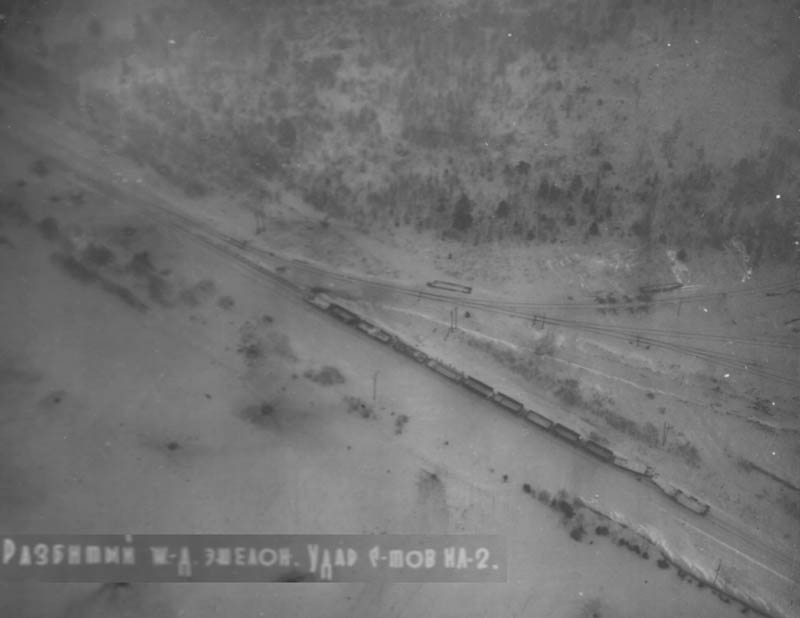
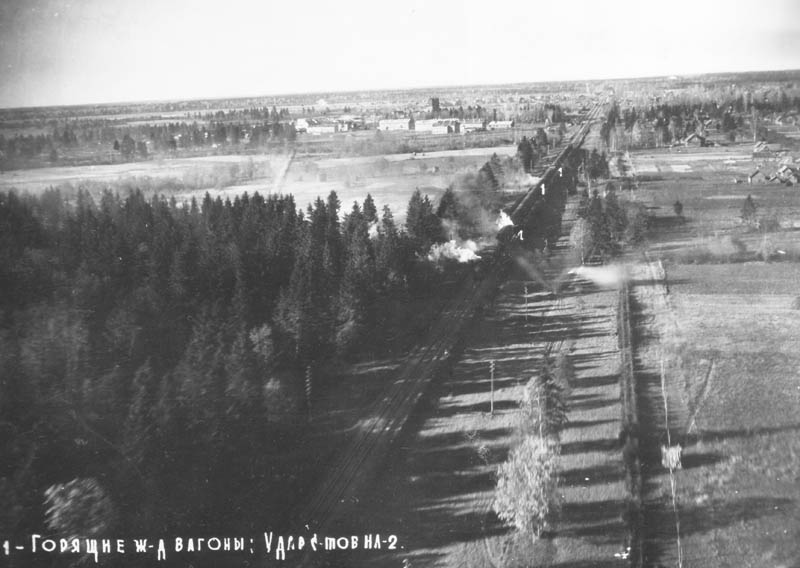
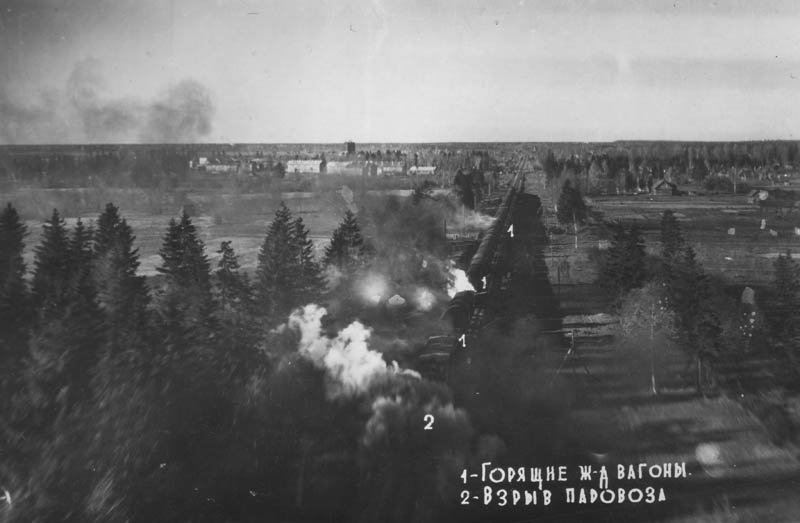
— When you accomplished your last mission during war?
It was in January 1945, from Ezel Island. From that same airfield Kogul, that
was used by 1st MTAP to bomb Berlin in 1941.
I had a break and didn’t fly. I was sent to a vacation because my airplane
was destroyed. It was an all-metal, lightened airplane. It was called a “heavy
fighter”. This airplane was brought to me to Gora-Valday airfield by my
instructor Yakov Forostenko. After the war he became a distinguished coach and
set two world records. {26}
— What was this airplane type?
Il-2-“heavy fighter” issued in small numbers. All-metal. It had
arrowed wings to improve spin characteristics. {27}
Everybody in the regiment knew that I do not allow flying my plane. Once Nikolay
Nikitin came to me. We were the first in the regiment to be nominated to the
Hero of the Soviet Union.
— Batya, I have to go on skip-bombing mission. Please, allow me to fly
your plane.
I said:
— Take it. I will allow it only to you, no one else.
He returned from the sortie and said:
— Never give me this plane. It rolls over. I could barely take off and
it tends to fall down. It is light, unstable and too maneuverable.
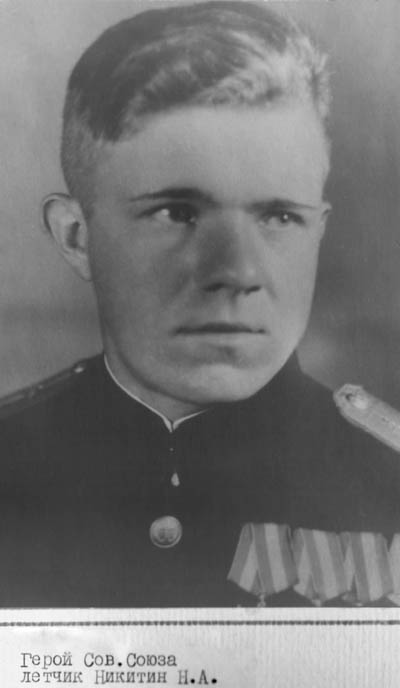
Pilot Nikitin. He was the pilot who brought a mast in the wing of his Il-2. Later he was awarded HSU
Then I got sick and the regiment doctor told about it to the regiment commander,
who sent me to rest. Soon there was an order to take off. Igor Ladnov, who for
a long time wanted to try my airplane in the air, asked the squadron commander
to allow him to fly it. He flew it and got killed…{28}
At this time the Admiral visited our airfield, and sent me on vacation. But
vacation was not too bright: I found out that my six cousins had already perished
in this war… Imagine how did I feel… I returned from vacation, flew
to Ezel island. My friends moved there from Pyarnu. The commander said:
— You have an ASW search mission. Look for it at Irben Strait between
Kurland Peninsula and Tserel Peninsula.
We flew that mission. Flight commander Serafim Urybin, of Khakas nationality,
who flew with me, was about 10 years older than me. He was a smart man and he
flew more than I did. Before the war he was a border guard, and then he became
a flight instructor.
We flew and flew, it was time to return but I missed to observe a snow band
that covered the island with snow. Urybin managed to land and I didn’t.
I had only few minutes worth of fuel. There was no chance for a second circle.
I got out of the snow band at the altitude higher than the snow band. I saw
a tower sticking from the snow, I recognized it. It was a village nearby. In
the other village, Iffelkonna there were two churches with a cross on one, and
a cock on the other. I navigated using these landmarks and flew about 15 km
literally at bush-top level to the airfield. At the Ezel Island there is no
way to belly land, it was seeded with large stones. That’s how my wingman,
Yan Borin got killed…{29}
What should I do? Suddenly I saw a blade of windmill to the right of me. At
Kagul airfield it was a windmill. Here I saw green flairs flying towards me,
showing direction for landing. I descended not knowing how much altitude was
left: 10 or 5 meters. One second passed, two, three. I pressed brakes, but was
still flying. Suddenly the brakes started working — I caught the ground.
I switched the engine off and stopped. I didn’t see the ground at all,
only flares. I got out of the plane, almost in shock. It appeared that I stopped
not far from the aircraft parking area!
Suslin and Tretyakov came to my plane and say in unison that there can be no
second landing like this for one pilot.
Then they added: “Go to the barracks and celebrate. And don’t come
to the airfield…
I was celebrating for a day, two days. They heated the bath so hot that an old
clerk crawled from the bath and started to lick ice on the porch. This «celebration»
continued for another four days.
They probably decided to protect me and an order by VVS Baltic Fleet Commander
Samokhin was issued to send me to Higher Officers Courses.
That was my last flight.
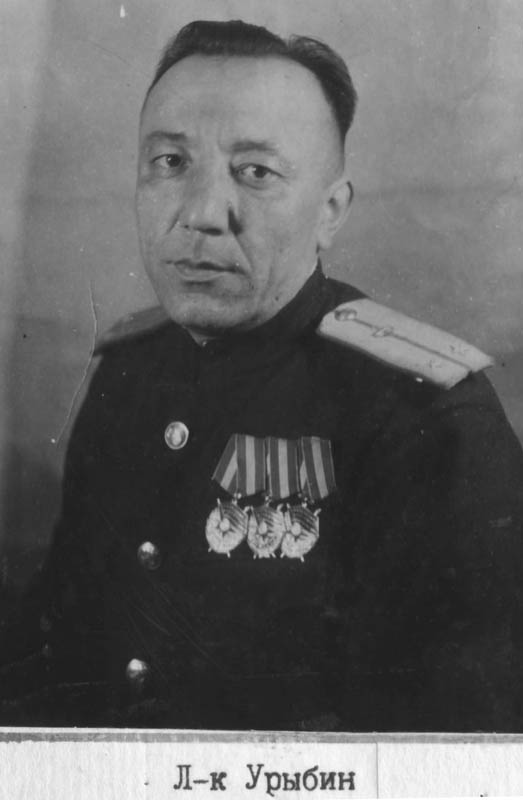
— How did you find out about the war end?
I came to Mozdok for courses. On March 6, 1945 a decree of Presidium of the
Supreme Council was signed and I was awarded the HSU.
A group gathered: Grib, Strelnikov and I. We went to Moscow, where we received
Golden Stars. I decided to return to Mozdok through Poltava and visit my mom.
It was a difficult trip, there were no buses then… I came home, my mom
met me. A neighbor stopped by, an old man Ivan Pavlovich Batievskiy. He was
a good man, he adopted several orphans. He had no kids, so he took two orphans
to live with him. We had some tea, I went to bed and in the morning the old
man was pulling my leg, waking me up:
- Wake up, Victory!
I got dressed and went to the Market Square. The village was old, it was a large
one. It was almost completely destroyed during the war. There used to be a fortress
there. Before the revolution there was a water supply system, sewer system,
and electricity. It was an estate of Prince Bezborodko, he was a Prime Minister
during the rule of Catharine II and the estate was managed by Count Paulson.
This village - Gorodishe, is over 1000 years old. When I came to the Square
they already constructed a podium. There was a crowd of people, everybody cried,
the war was over but everybody cried. There was a large crowd. My grandfather
was there too. Out of six brothers five were killed, no one knew what happened
to the sixth. No one knew how my uncle perished. We found out later that he
escaped from the POW camp, and made it to the American Army. There he was given
a rifle and sent to battle. He was killed.
Now population of our village is three times less then it was on the Victory
Day. Keep in mind that young people that were sent to Germany for slavery, did
not return, as well as soldiers haven’t returned too. That’s the
situation there now…
I said few words. By train I went back to Higher Navigators Courses. We thought
that after graduation we will go to fight against Japan. But while we studied,
the Japanese war ended…
— After the 35th regiment was disbanded you were transferred to the 7th Guards regiment. How long did you serve with the 7th Guards?
God knows. Do you think I remember everything? It was in 1947, I think. They
lined the regiment up, Vasya Spirov, the head of Operational Department of the
Staff, carried the regimental banner. But the regiments’ veterans were
not given a chance to farewell the banner. I was deeply offended; “You
didn't give us a chance to say farewell to the banner and I spilled blood for
it, was wounded twice».
And that was done by our own people. It was also an interesting event that does
not relate to the war but rather to politics. Beriya dismantled the entire Naval
Staff. They fired Admirals and others. Changes also started in aviation. New
commanders came in that did not fight in the war. Such a mess!
— Did Beriya dismantle this for a good reason?
I do not know, I can’t really say… I can’t judge. But new commanders were clueless, they didn’t understand a thing about the war or about life. It was clear.
— How long have you been with the 7th Guards?
Probably till 1949. No, not in 1949 but in 1948 I think, when I went to the Higher Courses. In a year, in 1950, I already graduated.
— And where did you get after this?
Where did I get? Out of favor. Do you know what does it mean to be out of favor?
— I know but I don’t know what it means in your case.
It was an episode when I offended the top Commander.
— How come?
I offended the Commander. And he was a good Commander. He was good looking,
smart and sensitive to people's needs. You see, I, the Captain, offended Lieutenant-General!
It was in 1951.
His weight was 144 kg, he was sitting in a double chair. I came to his office
and instead of talking business I said that a Commander has to show an example
of physical fitness. He got up and smashed a table with his fist.
Get out!!!, he shouted and fell to the carpet. While I was maneuvering to the
door I saw him falling on the carpet. I told to his adjutant to call a doctor.
The General was really good, very smart, and very sensitive.
— Did he die then?
No, he did not. He was observing me for a long time. I was flying jet fighters
and he sent me to torpedo-mine planes, so I was launching torpedoes and laying
mines. Later I transferred to jet fighters. I flew at night at minimum weather
conditions. What does that mean? It's when the ceiling is 100m. And this is
at night, not during the day.
So I was flying at minimum weather conditions, I was launched when someone was
approaching the border. That how it was. Kolya Semernyakov shot down a border
violator and was awarded the fifth Order of the Red Banner.
And the General was really good. In a year or year and a half I met with him
in Moscow. I greeted him. He told me that he lost 16kg of weight. He told me
that he went to Karlovy Vary.
The next year I met him again in the hotel of the Central House of the Soviet
Army. He told me: «Hello, I lost another 16 kg of weight. And why aren't
you going to the Academy? I am not a Commander any more. I am Chair of the Aviation
Faculty of the Naval Academy. Why wouldn't you apply?»
I wanted to go. I came with a report to Preobrazhenskiy, Commander of the Naval
Aviation, he was the first to bomb Berlin. I made a report. I suggested how
to save one combat unit. He said that it was good and what I was planning to
do. I replied that I wanted to go to the Academy.
- Why the hell didn't you come yesterday? I just finished the assignments to
the Academy. He made a call and there were no more vacancies. That's how it
happened.
— That is, you were not allowed to study in the Academy?
I applied too late. If I came a few days earlier everything would be fine.
— When did you graduate from the Academy?
Who? I did not. I didn’t study in Academy at all even though all my subordinates were graduates. I was at postgraduate, graduated from the Institute, graduated from post grad, no Academy.
— When did you go to these courses? Professional development courses of what? What is correct name?
No, these were not professional development courses. They were called Higher Officers' Courses of Squadron Commanders. And later, the second courses, already in Riga, were called Higher Flight-Tactical Courses for Naval Aviation Officers.
— What did you fly there?
In Mozdok, before the war ended, I flew sturmovik over Chechnya. When I was at the courses I flew torpedo bomber.
— What type?
Tu-2. It was a good plane, excellent one, but it came too late. If it would
come one or two years earlier, the war might have ended several months sooner,
because it was a mighty plane. Pe-2 was an absolute junk. It was created under
impressions gained after the Germans started to dive at London and bombed precisely.
And we hastily built this Pe-2 machine.
It had an ability to dive, but its bomb load was just 1000 kilograms. It dove
rather poorly. It had two engines but no ability to fly on one engine. If one
engine failed it couldn’t fly straight, it went with a descent. What kind
of a plane is that? Two engine airplanes must have an ability to fly horizontally
on one engine.
Our sturmovik Il-2 with a 1600 hp engine could lift 600 kilograms of bombs in
overload.
— By the way, did you hang RSs when you took 600 kilograms of bombs?
Of course. Overload — 6 bombs and all the same. RSs and VYa 23mm cannons,
300 rounds per cannon, machine guns, 1500 rounds per barrel. Gunner also had
large caliber machine gun with ammunition.
Pe-2 was an unsuccessful plane. Tu-2 had lower speed than dive bomber, but 2500
kilograms of bombs. And it had longer range. It was a great plane, it could
fly on one engine.
But it came late, too late... There were not enough engines. This plane was
designed by Tupolev in prison.
— When did you start flying jets?
In 1952, it was MiG-15. Approximately a year before Stalin’s death. Since
I was demoted by the General, he sent me to a new Army regiment armed with Tu-2.
Tupolev’s machines were good, but obsolete, so many years had passed.
I wrote to a Deputy Commander of Naval Aviation that I want to fly fighters.
He replied:
- Commander report that you fly day and night, drop bombs, torpedoes and mines
well. I see no need to transfer you somewhere else.
But at this time our regiment was rearmed with jet fighters. So with the rest
of the pilots I was transferred to jets. We started to fly fighters.
— Were there many catastrophes?
How to say… Since I was demoted, I was given a flight — four pilots.
Four pilots, all sons of Colonels. One was a son of “Moscow-Partisans”
air bridge commander. Anatolii Natychiv, handsome guy, great sportsman and smart
too.
The second was a son of a Colonel who was killed in Japan. The third one was
also a Colonel’s son. The forth one was a handsome young boy who quit
studying in Machine-building Institute as he wanted to become a navy pilot.
He graduated from a flight school. We flew at large altitude. The air there
is thin, he didn’t note it and gained too much speed. He almost hit me
with his wing. I managed to turn away. The second time we fly – same situation…
And that went for three times, he almost rammed me. I told him:
— Alexander, you know, leave aviation, you will collide with somebody
and die.
Many years later I met General Popkov, twice HSU. He commanded a Division, where
I transferred Alexander. I asked him:
— Do you remember such a man?
It happened that the General had excellent memory:
— You know, I remember him, I was constantly bugged by police because
he would be in traffic violations all the time, on a bridge, red lights, etc.
He did it deliberately to be discharged.
Alexander crashed. Flew at night in jet fighter and crashed.
Anatolii Natychiv flew somewhere in the North. He came to my apartment in Moscow:
— Comrade Commander, I will come to you first, when I will receive promotion
to a General rank.
He got new airplane, something broke in it, the plane started to shake. This
plane had a new ejection system — you pulled a curtain over your head
so that air flow would not damage eyes and mouth, then a catapult throws you
out of the plane.
He pulled the curtain but the ejection did not work properly, and the airflow
ripped his head off. I didn’t believe it. There is a cemetery in Vnukovo,
there I came across a monument with his portrait: «Distinguished Military
Pilot of the USSR, Colonel Natychiv». He really perished.
I once saved him from a scandal, gave him 5 days imprisonment. Somebody was
already calling the VVS Commander, to the political department so that he would
marry a girl. He came to me and said:
— Trade Unions wrote a report on me.
I replied:
— You know what, go and tell them that I arrested you for 5 days.
A paper came with a demand to punish him. But I already did it, and no one else
could do it now – one person can’t be punished twice for one deed.
— Could you tell about night missions?
The 1st squadron of the 35th regiment started flying night missions beginning
from 1944. The first training flight was made by the regiment commander Vasiliy
Kuzmin. He was the one who came with the initiative of night flying. He flew
night missions even in 1942 at moon light in a single seat sturmovik searching
for boats. He then wrote a report about his experience in night flying.
In 1944 he met an adept of night flying Senior Lieutenant Tretyakov Petr, who
just arrived to the regiment. He was 9 years older than me, took part in famous
Kiev maneuvers in 1935 when we showed to Europe that we had an army. Then he
became aerobatics instructor in Moscow Aero club. He knew all famous pilots.
During the war he graduated from a flight leader courses and received a rank
of Lieutenant.
Kuzmin and Tretyakov took off together in a twin-control Il-2 at night.
The second to fly was supposed to be me. We trained in UT-2, than we trained
in a dual-control UIl-2. But it happened that I had a bad night sight. Ilyushin
created an airplane for a battle field, not for night flying. At night exhausts
from AM-38 blinded a pilot from both sides, flames flew 1,5 meter over the pilots
head. But our squadron engineer managed to tune the engine so that a pilot would
not be blinded during take-off. We started to train at night flying. But the
German saw searchlights and bombed the airfield. I was going to my plane to
fly a training mission. At this moment bombs fell. I fell on embankment and
the bombs were exploding on the other side of the embankment. Thus I didn’t
have a chance to make a training flight this night. On the next night we flew
without searchlights. Then we flew combat missions at night.
– Did it have a «Pioneer» air horizon instrument on it?
There always was one. We also dreamed of having illumination bombs. There were
other interesting thoughts.
First night mission we flew with Tretyakov against Finnish long-range artillery
battery near Kristaniemi lighthouse, he took me as his wingman. On the way I
saw an airplane coming towards us. I shouted:
— Airplane!
Airplane flew towards us head-on. We shot: eight traces, four mine, four his.
Tretyakov believed in me because I noticed the enemy plane first. We became
friends. Of course we argued, everything happened. But he was 9 years older.
I was his deputy. Flight commanders were also 9 years older than me. It was
hard for me, but they listened to me. I lead them to battle. They were very
good pilots. Apart from them we took two pilots from another squadron and trained
them to fly at night. Vladimir Laptev and Viktor Popovskii. Viktor was shot
down over Gulf of Finland at night, but managed to ditch without actually seeing
water. At night! Our torpedo boats were patrolling the area and luckily they
came fast and fished him out. We wrote to each other after the war ended.
The main difficulty in night flying was to take off — exhausts gave large
bright flames.
— Were there any covers, which would block exhausts from the pilots eyes?
We tried to use them, but with no success. We also tried to use special goggles,
so that muzzle flash from cannons wouldn’t blind us. But it was not entirely
successful too. One more thing – at night we hardly could see the gun
sight. We found one situation when you could precisely use rockets and guns,
just we had to be careful not to hit water. We located a “Moon road”
and a dark silhouette on it. I made one attempt but missed it. It was too low
to aim. It was their submarine among caters. While I was turning for another
attempt, the German realized it. When I saw the Moon road, he already went under
water.
On the second day I also looked for submarines. I located it again, but again
I was afraid to hit the water and had no chance to launch rockets and drop bombs.
While I made the second circle it went down and disappeared.
There was a serious fight. Near Tallinn there were “fishers”, they
tried to catch us. A fisher – it’s a fighter with landing lamps
turned on…
Sergei Mishin was the first to see how beautiful exploding rocket looks like
when it hits the enemy ship at night. Fireworks, beautiful traces. I had a couple
of chances to see it too. It was very difficult. But our main task was to make
sure that ship crews that guard mine positions, will not have a good night sleep.
At day time the whole regiment flew out, and our first 1st MTAP also flew. This
went on for many days. The squadron, the regiment, the second regiment, we all
bombed this minefield that was protected by dozens of guns from those large
boats.
Once it almost leads to a catastrophe… Pilots were sleeping yet, while
technicians were preparing planes for day and night missions. They had no brake,
they did not sleep at all. Tretyakov said to me:
— It’s a catastrophe…
He went to the HQ and reported there.
— Did the Army aviation pilots fly at night?
There was no need. Experience of night use of Ils is very limited. At the Black
Sea by high command order there was a need to bomb Tuapse airfield. Pilots from
two regiments were trained. Only few pilots, they made two flights and that
was it.
Boris Morozov, the squadron commander from the 8th Guards regiment VVS Black
Sea Fleet told me about it, he was one of those select pilots.
Do you remember «I fought on Il» book? There it is written that
the Army pilots flew. They wanted to fly at night, acquired a double-seater
plane, it was already available, they trained pilots, always during the day.
They took off, started to land, switched the searchlight. The German was patrolling
overhead, hit at the searchlights and shot down the plane. It is in this book.
Besides that the author of a good book «In Tough Combat Air», HSU
Vasiliy Borisovich Emelyaneneko wrote that the Navigator of the 7th Guards Regiment,
the Army, no Naval, wanted to fly at night. He took off, circled for a while,
landed and said that it is impossible to land because of blinding by exhausts.
That’s all, there was one other mission flown at dusk by a single pilot
to attack a bridge over Don River. No other information about night missions
is known. The only squadron that made about 40 night combat missions and 80
night training missions was ours.
— You say that your 1st squadron had flown 80 training night missions and 40 combat missions?
About 80, no less, because we had to train, show how to land, and not once…
— You personally made over 12 night sorties?
I flew 12 night combat missions. Semishin made 13. Other guys flew a bit less.
There were very experienced pilots, older than me, Simikhin, Urybin, Harlamov.
He was a champion, or to be exact – record setter in night parachute high
altitude jumps. There also was a flight commander Popovskii. Several men were
killed. Not all flew combat missions. I commanded the last night mission. We
attacked a group of ships at night from two sides. At dark, it was a moonless
night. Urybin lead the flight. We returned, honestly reported that we almost
collided. We were told:
— The Commander had forbidden night missions. Pilots from the other regiment
trained and one collided with the target at a shooting range presumably because
he was blinded by cannon muzzle flash.
It happened in the 7th regiment of our division. That’s how our night
squadron ended. Commander Samokhin had closed all night flights. By this time
I had all papers that were needed to install an artificial horizon in the planes.
We were not only ready to receive artificial horizons, we already arranged with
our Division Navigator Major Klokov, that we will be given illumination bombs.
It was attached to a parachute. One pilot would drop it, the bomb hanged on
a parachute and illuminated the target area. Other pilots would come from the
dark and attack. We had great plans, but an order is an order. It all stopped
there.
— You said that your Il was silvery, without camouflage? You flew it this way, or was it repainted in the regiment?
Nobody painted it. I used to have photos.
— Your plane differed sharply from the others and clearly attracted attention. Did they constantly attempt to shoot you down?
No. What do you mean constantly attempt to shoot down? There is a wingman with guns behind me. They could shoot me down if I am going after them first.
— Here is a photo: airfield Kerstovo, 1944, the 12th IAP commander Volochnev gives out an award.
I don’t know what to tell about him. I know that he arrived to the front
not from the beginning of war. During his first sortie he got it. People who
had already fought told us that he shared his experience after his first fight:
— Only crosses around, no our planes to be seen around, only crosses around…
— Let’s talk about pilots. Was Romanov a squadron commander?
Not just a squadron commander. Senior Lieutenant Romanov commanded the squadron
from the 7th Guards regiment based at Seskar Island.
I met one old man about 10 years ago, he was 90 then. Former Engineer-Captain.
I placed his article in a book “Veterans of Arbat”. He told me that
when the Germans in the first days of the war reached Tallinn, there was a mess,
no one knew what to do. This Captain Engineer was given a detachment of seamen
to try and stop Germans. He participated in attack with Voroshilov, who was
wounded then. He said:
— In the movies it was shown that Voroshilov was dressed in Marshall’s
uniform. It is nonsense. He was attacking together with sailors, with a simple
rifle in his hands, in brown leather coat.
He also said about himself:
— I’m a war criminal. We captured a German then. If there were a
dozen of them, I would have sent two-three sailors to escort them to the rear.
But he was alone, so we executed him. What could we do? Germans were already
surrounding us.
He constructed airfields on the islands, on Lavensaari, on the Seskar. During
the second war winter the command decided to base a shturmovik squadron on Sescar
Island, because there was traffic of Finnish caters. And the strip had to be
elongated with stones, it had to be reinforced from the sides as well. This
engineer expanded the strip on Sescar so that shturmovics could take off. The
fighters managed to take-off somehow and for shturmovics with bombs it was difficult.
And was it the use to fly without bombs?
Captain Romanov’s squadron was based at Seskar during cold season. It
was difficult to stay on a runway at such a small field. My flight commander,
senior lieutenant Yushkevich, Leningrader, perished at strange circumstances.
He took off with a navigator who came from the other regiment. What for - unknown.
He might have been penalized… They took off and something happened to
their engine. Yushkevich ditched near the island. It’s a shallow place,
so the cockpit and upper surface of the fuselage were still visible. No one
left an airplane. Neither the pilot, nor his gunner, who was a lieutenant with
a Red Banner Order. When this officer’s body was recovered from the rear
cockpit, a bullet was found in his head. It seems that he committed suicide.
It is still not clear why this tragedy happened. {30}
It is quite possible that Yushkevich tragedy started earlier. He missed at the
strike on the frontline and dropped incendiary bomblets at our side of the frontline.
Several our soldiers suffered from burns. It was hard for him to live it through…
— Stolyarskii…
Kirill, aka Ikar Stolyarskii told me stories, because I used to be his deputy
squadron commander when we flew jet fighters.
At winter 1944, can’t tell you exact date, he intercepted bombers. Germans
sent bombers, which were identified by our radars. Fighters were sent with a
task to intercept them and met with them over the enemy held territory. A fight
started with escorting German fighters, Kirill was shot down and Valentin Poskryakov
was shot down, but managed to walk home by foot on ice…
They fought over Chudskoye Lake, where Aleksander Nevskiy defeated invaders.
The battle was over that place. I also flew over this area. I saw this stone
that Aleksander Nevskiy allegedly used as an observation point.
Kirill Stolyarskii made a forced landing. He had no idea where he was. He made
it to the shore, and marched through a forest, somebody shouted in German:
— Hands up!
Kirill said that he grabbed a pistol when somebody else said in Russian:
— Look, he is even grabbing a pistol!
He was surrounded by our partisans. That’s Pskov oblast, Chudskoye Lake.
Their commander said:
— Man, you are lucky. Only yesterday the Germans were in this forest,
we just pushed them away.
Partisans gave him written confirmation for six enemy airplanes downed. Kirill
said:
— Listen, my dad is a General, please, send me over the frontline, please.
Kirill had a leather jacket, a nice one, General's. His father, General Stanislav
Stolyarskii sent him to the frontline:
— You know, go and fight. Or people will say that General’s son
hid in the rear.
So he went to the front. Partisans understood everything and communicated with
high command. Several days later they sent him across the frontline. He returned
to his regiment, others show him newspaper, where it was written that the commander
awarded participants of this sortie with the Order of Alexander Nevskii despite
the Order statut – it was allowed to be issued to high commanders only.
Because the pilots fought over the historic battlefield it was decided to award
some pilots with this Order. He was not included. He fought with them, shot
some plane down, got shot down himself, and he was not included. Kirill said
to me:
- He told me that he was very upset because they forgot about him.
He took the confirmation note and tore it to pieces.
Partisans watched the fight from the ground and saw more fallen enemy planes
than pilots did.
He was a good man, he did not put himself higher than others despite the fact
that he was a General’s son.
Different things happened at war, for example, my wingman Ivan Popov was court
martialed and sent to a penal company. He abandoned me in a snowstorm. He did
his time in a penal battalion, was awarded with a medal and an Order. Many years
later I found out that he was a good lad, but with a bad eyesight. After the
war I read an order by aviation commander Zhavoronkov in Gatchina archive: «Lieutenant
Popov, due to inability to fly should be relieved from flying”.
He learned all eyesight check table, all letters. When new charts came with
different letter location he was caught on cheating. He had bad eyesight.
When he fought in the penal company, a plane landed in front of him: white spinner,
red numbers on fuselage. That’s his former squadron. Spinners in different
squadrons were painted differently. And tactical numbers were different. 20
to 30 – that’s one squadron, and so on… He saw it and ran
to the plane that landed on the Chudskoye Lake shore…
I lead a group that time. In a dogfight fighter pilot Ivan Gatalskii chased
off two German fighters. They shot at each other without any effect and parted.
But one German turned around and fired at our last airplane. It was piloted
by Voronov, the regiment veteran, who by this time was already wounded and flew
on prayers. The German hit him with one incendiary shell that pierced rear armor
and stuck in the parachute. Voronov flew like on a grill for forty kilometers
to the shore. He made it and landed, but his gunner was already dead…
He was a beautiful guy, that gunner…
Ivan Popov ran to the plane, and pulled wounded Anatolii out of the plane…
My flight commander Serafim Urybin flew after Voronov in a wide body ambulance
Po-2. It was possible to place there 2 man and escorting paramedic. Serafim
returned and brought Anatolii. Besides him was a bearded sailor who got out
of the plane in a striped naval shirt, with a dagger and machine-gun on a shoulder.
He got out and stood in front of me. I looked at him — Popov Ivan!
I was a member of the Officers’ Court in the regiment. At first he was
judged by the Officers Honor court. But I refused to participate. I left. They
decided without me. They passed the case to the court martial, which sentenced
him to a penal company. It happened at winter, now it was mid-summer. He stood
before me…
No, it’s not the discussion I can describe by words, not that kind of
emotions. What could I tell him? He came to us hoping that we will let him stay
with the squadron. With his former squadron. We stood looking at each other,
people talked behind my back:
— Why do they stand like this?
— They have some unsorted business between them.
Then he cried. I send him away. I didn’t know all the truth then, only
after the war end I found out that he had poor eyesight, and couldn’t
see me in the snowstorm…
Such emotions that I can’t express them. Stupid fool he was. He wanted
to be dressed in pilots uniform, putting not only himself at risk, but all others
around him.
— An Armenian from Banifatov’s squadron. His surname was Markusyan. What happened to him?
A fighter pilot, Ivan Ivanovich, I forgot his last name. He was a known pilot with four Orders of the Red Banner. I met with him after the war at Lebyazhye airfield. While escorting Ils he noticed one damaged shturmovik that was deviating and swinging. He approached it, looked into the cockpit. There was a pilot, whose face was covered with blood, he flew the plane, but saw nothing, the airplane shook. Ivan started giving him advice. The airfield was large in width and length. The sturmovik landed roughly, but safely.
— Lieutenant Provotorov.
Lieutenant Provotorov… We met after the war, had a drink together:
— Batya, — he called me Batya, shortened from Batievskii. —
Batya, what for did we fight?
Once he flew as a cover for us. I was attacking a train, when I suddenly noted
that AA gun was turning towards me. I flew straight at it. Then Provotorov opened
fire from a steep dive and everything around this gun was minced. It was all
torn by his long burst.
God knows if I would fly at this gun, it might have fired at me from point blank
distance. I also had similar cases. At least one such case. I was aiming at
the enemy ship when I noticed that my wingmen are about to be shot at. I turned
toward the AA guns and fired at them. In sake of my pilots I did not attack
more important target...
— What can you say about Yurchenko?
Yurchenko was an excellent engineer in our squadron. For example, I can say that it was a task to tune engines for the most favorable mode. And this was accomplished under the leadership of the regimental engineer Mikhail Melentyev who had higher aviation engineering education. Valentin Yurchenko after the war was a commander of ShMAS – school of junior aviation specialists of naval aviation.
— What can you tell about Chehlotenko?
War is not only “Hurray!” but people with different complexes.
We had a serious disconnect with Chehlotenko and serious one. We both got five
days arrest from Colonel Petrov for it. I wasn’t guilty, but still...
Belfour I entered the regiment I used to be a unit Starshina in the training
squadron. Special 7th training squadron was created at Levanevskii School. We
were taken from Stalin Yeisk School and transferred to Levanevskii School.
When we started flying from Kamenka airfield the situation was difficult. Germans
dropped leaflets, "give up…" and so on. During the war only
one pilot Kulakov had defected to the enemy. It happened in 1941. His wife worked
in Voentorg. She stole a bag of money, he removed armored backrest from his
I-16, she hopped on his shoulders and they flew to the Germans. The Germans
kept printing leaflets "Take example from Kulakov" and were dropping
these leaflets at night over the airfield.{31}
Our area of operations was a difficult one, there was a breakthrough in blockade,
to the south were Sinyavino Heights, to the north – Ladoga Lake. The Germans
were at the Heights. Between Lake and Heights there were marshes for 8-10 kilometers,
and there were our troops. We bombed positions at those heights. All the time
we bombed and strafed them.
In one flight we made four attacks. Once we got to the Lake shore, gained altitude
and dove there. Then go back across Neva River and dive again releasing the
rest of the bomb load. Alexander Chehlotenko said:
— I destroyed a staff bus.
I wasn’t a serious figure then, just the Starshina before I graduated
from the flight school. I said:
— What are talking about? What fool would locate a staff but at the frontline?
What a staff bus will do at the artillery positions?
On the second sortie he said again:
— I attacked and destroyed a staff bus.
I said:
— What are saying? What bus? Where did you find it?
After the third mission he reports:
— I strafed a staff bus.
— What are you talking about?
I cut his crap because it was outrageous. All the time strafing a staff bus
on the front line — what for it was needed there? Alexander took it seriously,
got offended and remembered this. Then it happened that we flew in Yak-7b’s
from surrounded Leningrad. Valentin Poskryakov took me in his plane and I was
closed in the rear of the fuselage. If a dogfight would take place, I have no
idea what could happen to us. We landed in Novaya Ladoga, there were repaired
airplanes that we were supposed to fly to Leningrad.
We had to test-fly them first. We did it, got paid for test flight – 127
rubles and 100 grams of vodka.
Alexander was appointed as a leader. I took off after him, he banked his wings
— "get closer". I formed tighter formation. He rocked his wings
again — "get closer". I understand that he drank his 100 grams
but I obeyed. We flew at a distance of 5-6 meters from each other.
On the way it was a high-voltage line, probably from the Volkhov Power Plant.
They were down but he was flying under the wires. And this is unacceptable!
He flies, looks to the left, on the landing we always looked to the left. We
fly by the metal tower. He made it through. Between this tower and another tower
there were other wires hanging. I had to fly even closer to the grass in order
not to get caught by the wires. Being a fool I went under the wires. He turned
around and flew under the wires again, now at an angle. We had to fly to the
airfield. This time I jumped over the wires. Did I need it? We came to Priyutino
airfield in a tight formation…
I forgot to mention one thing: at a distance of 5 meters it is easy to catch
the leaders tail with propeller. And it is very difficult to keep formation
and speed. In Chehlotenko’s rear cabin a man was sitting, and threw something
at me. I couldn’t understand what it was. Threw once, the second time,
the third time, some pieces flied at me. This man gestured: «What are
you doing?» We came at the tree-top level to Priyutino. On the other end
of the airfield there was a wall of trees. And we came in very low. Suddenly
Alexander started to turn at me, but I was lower than he was. I had no place
to go, if I went lower, I would hit the trees and if I went up, I had no idea
if the engine would give enough power to bring me up sharply. He was turning
in such a way that I had nowhere to go. I eventually jumped over his plane.
Colonel Petrov, the regiment commander saw it all. And issued five days to both
of us. But story didn’t end there.
Several months had passed, I already returned from the hospital. Chief of Naval
Aviation of the Soviet Union, General-Colonel (later he became a Marshall) Semen
Zhavoronkov came with inspection. He was a former cavalry man during the Civil
War.
— Junior Lieutenant Batievskii!
I stood up.
— I’ve been told that you were not awarded? If you will continue
to jerk like this again you will get no awards!
It appeared that all divisional leadership did not know that this story was
reported to the HQ of the Leningrad Front. The guy who was in the rear cockpit
of Chehlotenko's plane was an engineer from the Leningrad Front Staff.
It was he, who threw potatoes at me, which were precious as gold in surrounded
Leningrad. He did not mind and was throwing them at me to save his life. Zhavoronkov
promised to put me in jail for another case like this.
Why Alexander didn’t like me I do not know. I didn’t argue with
him anymore. I do not know how Alexander Chehlotenko perished, he was a pilot
in the third squadron. {32}
In the third squadron it was a good and courageous guy, Captain Mikhail Lobachev.
He came to Naval Aviation from the Marines, studied a machine gun pretty quickly,
learned how to shoot and started flying. I think he made about 30 sorties as
a gunner. He created a special climate in the 3rd Squadron. In fact different
squadrons had differences, each had its own attitude.
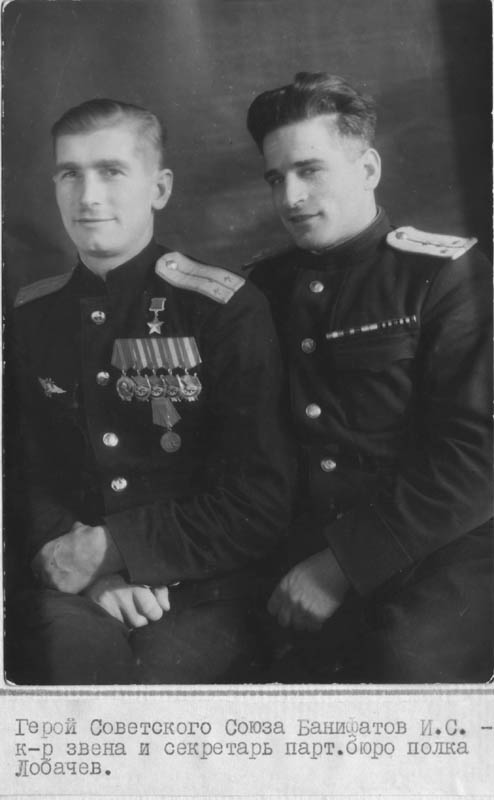
— Mikhail Yavasov?
When he shot down his ninth plane, he came to me at debrief:
— Did you see it? Sign the confirmation.
I saw and I signed. A few hours later he perished before my eyes in the sea
during the attack of enemy ships. He was shot down at that same place where
he downed the enemy fighter couple of hour’s ago.{33} Great man. War…
— Fedor Seleznev.
In that flight when I flew with photo cameras, Fedor Seleznev missed after
I was hit by the AAA and the enemy Messerschmitt attacked me. Fedor told me
later:
— Something fell off your plane, I thought that these were bombs.
But that was my plane breaking apart. A fighter hit me in my hand and head.
I came to my senses and landed at our territory… I already told this story…
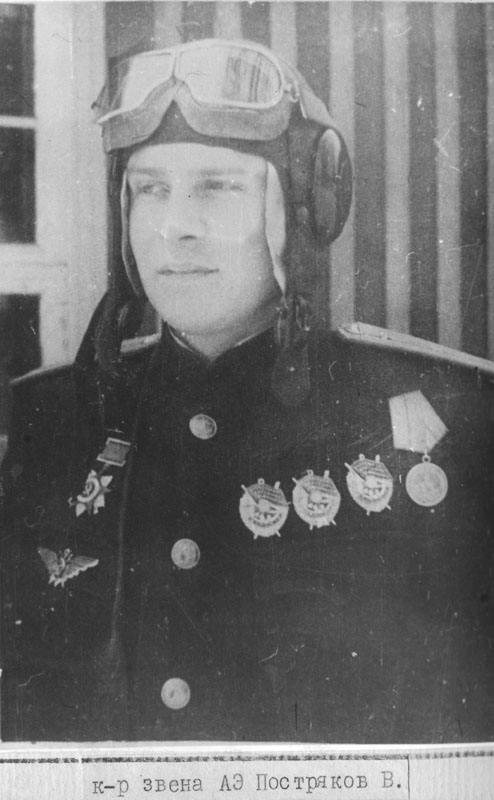 —
Valentin Poskryakov.
—
Valentin Poskryakov.
He was a good fighter pilot, we flew together. He was shot down over Chudskoye
Lake at winter. We already had radars. We had “Redut” radar near
Leningrad at the time of the Finnish War. We learned to use them.
From Estonia a group of German bombers was approaching. Our fighters flew to
intercept them on the other side of the frontline. A fight started over Chudskoye
Lake and Valentin Poskryakov was shot down. He landed on ice. He started to
camouflage himself not to be visible on white snow. He survived… Then
he lived in Stavropol, he was responsible for fireworks, but then he organized
fireworks in a central park of Stavropol and a fire started. There was a huge
scandal…
— Major Kuvshinnikov.
I think that this person had affected the fate of my friend Vladimir Tikhomirov. Tikhomirov deserved to be nominated for the HSU, he was a great fighter pilot and personally shot down 12 enemy airplanes and 2 in a group. Why he wasn’t awarded? He wasn't awarded because no nomination was sent out. Why it wasn’t sent? Nomination is done by a commander. It happened that Kuvshinnikov, who was a flying chief of staff of the 12th Fighter regiment lost orientation and landed in Sweden. Perhaps, this had effect on the fate of the regiment commander Sergei Belyaev and Vladimir Tikhomirov. Who could nominate bypassing the commander?
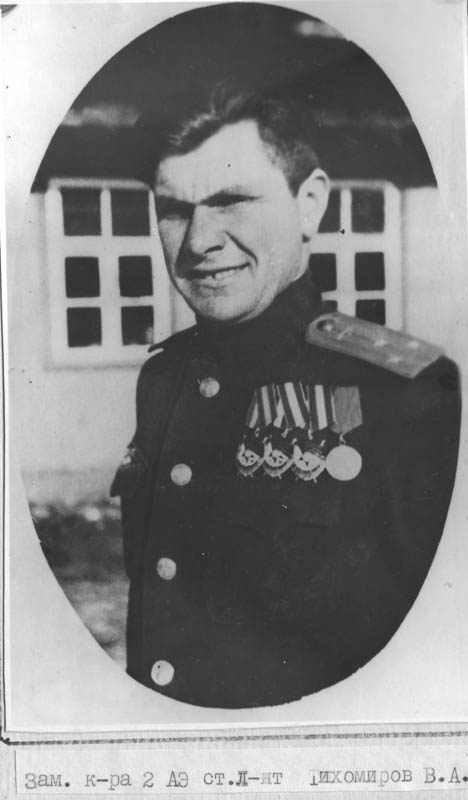
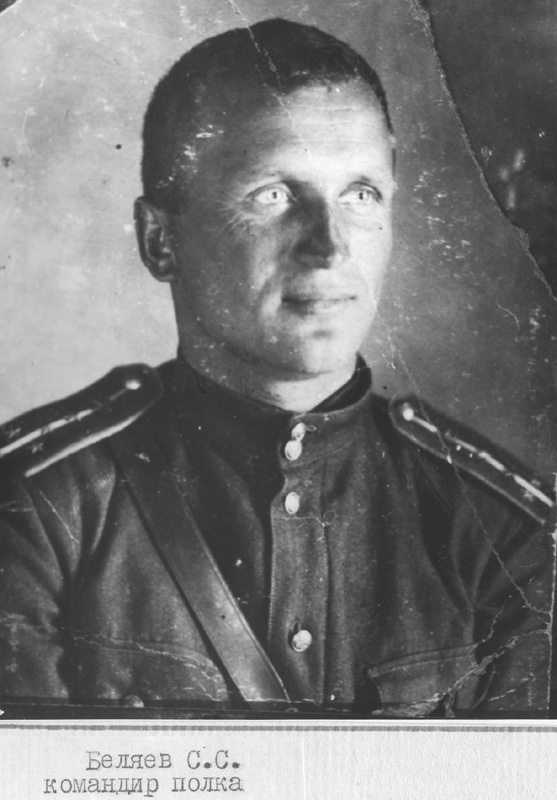
Left: 12 IAP pilot Vladimir Tikhomirov. Right: 12 IAP regiment commander Belyaev

12 IAP pilot Poskryakov
— Mikhail Rossihin.
Mikhail Rossihin was a good fighter pilot. He covered us outstandingly. I knew him well. He married a girl that he met at Kerstovo airfield. After the war he was a chief of Simferopol airport. He died of gastric cancer a few years ago.
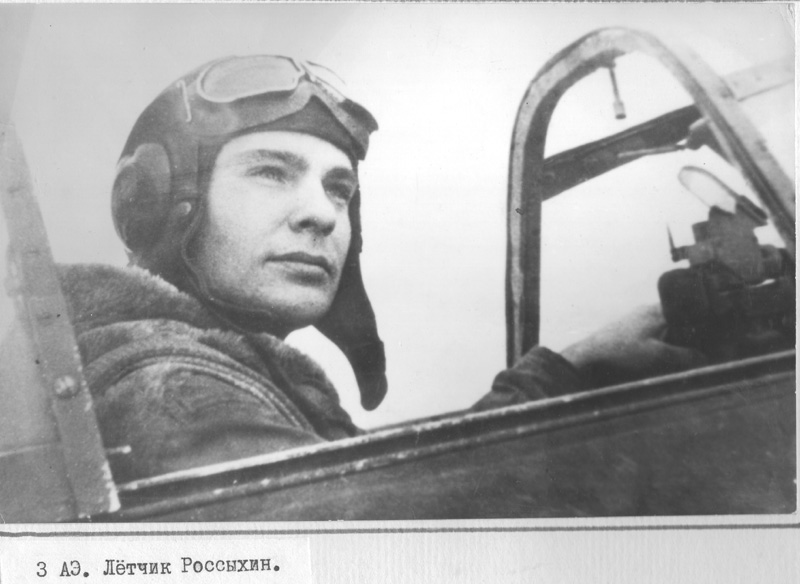 12
IAP pilot Rossykhin
12
IAP pilot Rossykhin
— Major Alehin.
Great fighter, he shot an enemy plane that flew beside me. There was a thunderstorm
and I lead my group into the thunderstorm. Two enemy fighters attacked us and
one was shot down by our gunners while the second was shot down by Alehin. Both
Germans were killed. It happened over the German airbase. Over 100 kilometers
behind the enemy lines. After this sortie a journalist embarrassed me.
— How did the aerial combat go?
I had especially serious assignment and told him to get lost. I had to organize
my data and to report about the engagement.
This guy continued to bug me, so I told him again to get lost in much stronger
terms. Later he wrote in the naval newspaper that the leader Batievskiy flew
in the thunderstorm and calculated that because of the storm the Germans would
not arm their guns. So it appeared as if I calculated this and all Baltic pilots
would think that I am so smart. At the end of the war when I already was at
the Courses one Guards Captain comes to me and says:
- Are you Batievskiy? Shame on you for saying that you calculated that the enemy
would not arm their weapons due to the rain.
And that was not me that was that journalist who wrote this.
— Lieutenant Proskochilov.
Lieutenant Proskochilov covered Major Alehin’s attack. Alehin aimed at the German while Proskochilov looked around, because we were near the enemy airfield. There could be up to 20 Focke-Wulfs, maybe more. They usually had a group of 40 based on two airfields.
— Petr Horunzhii.
Petr Horunzhii was a good fighter. We flew jets together after the war.
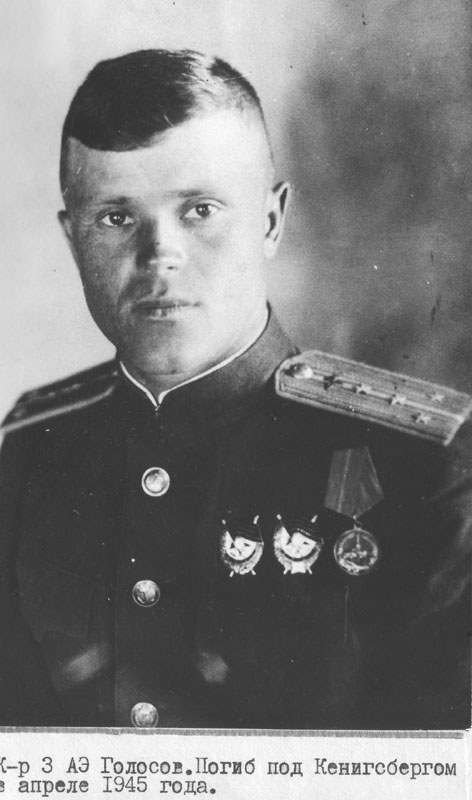 —
Ivan Golosov.
—
Ivan Golosov.
In one fight, when the German dive-bombers attacked an airfield at Lavensaari,
Ivan Golosov shot down three bombers.
Once Ivan came to me after the mission and said:
— Did you see that miracle when they dove into the water, jumped out and
flew away?
I replied:
— I saw it. But it can’t be true.
He said:
— I know that it can’t be true. At such speed water is uncompressible,
like a concrete. But it happened!
At the end of war, when I already was transferred to the rear, Golosov was shot
down by the AAA and perished.
— Leonid Ruchkin.
Ruchkin. Ruchkin… Seven enemy fighters attacked us near the German airfield.
There were 12 of our planes. He flew so well that none of us was even aimed
at. We landed, went to the canteen where the 1st squadron commander Captain
Tretyakov grabbed Ruchkin and said:
— Leonid, what have you done? I award you with an honorary pilot of the1st
squadron title. You saved the whole squadron! Alone against 7 Focke-Wulfs!
And Leonid was standing, his chicks hanging because of high Gs he pulled. He
was circling around us and seven German fighters couldn’t do anything.
He attacked one German while at the same time escaping from the attack of another
all the time. Due to the G overload he barely made it out of the cockpit. He
saved the entire squadron.
— We told this episode to Tikhomirov, but he said that he can’t recall such event.
I saw it myself. I met Ruchkin several years after the war, at Arbat in Moscow. I went to a grocery store, and suddenly saw Leonid Ruchkin. I had an apartment in the high-rise. We talked all day… He used to live in Rostov. I don’t know what happened to him now. He was an outstanding pilot. He shot down many planes. He brought two Thunderbolts to Baltics. Thunderbolt was an American high altitude airplane. They could reach high altitude and make reconnaissance flights where the Germans might not reach them. He was an experienced pilot and he was entrusted with this. No one knows about it or talks about it. What for…
— Here I see Vladimir Pokrovskii. But he was a North Fleet flyer?
I will never forget this guy. We studied at the Higher Courses and lived together
in one room. He was a wonderful man. He had wide shoulders like bear.
One famous female pilot wrote him letters: «Vladimir, I love you, I suffer…»
and so on. Other famous actress wrote him during the war: «Dear Vladimir,
I want to see you. Remember everything, I will never forget». And he was
like a bear. I kept in touch with him, but he died recently, no?
— No, he died in 1994.
In 1943 in VMF flight school Stepanyan commanded sturmovik department, while
Pokrovskii commanded fighters.
Perhaps, but this is a different story. I also had a flight commander after
the war. He was a cultural man, Leonid Kucherenko. He was singing songs from
classical opera.
He gave me advice when I argued with commanders. Even though he was my subordinate,
he still gave me advice. Then he became an instructor at the Naval Academy in
Leningrad. We met there. I had several smart guys.
— Can you say something about Kutakhov?
Kutakhov, that’s a Marshall of Aviation? Can’t say a word, aviation is big. I couldn’t know everybody.
— On the contrary.
It used to be small. There was an air brigade at the Baltic Fleet, and that’s all. And everybody knew each other…
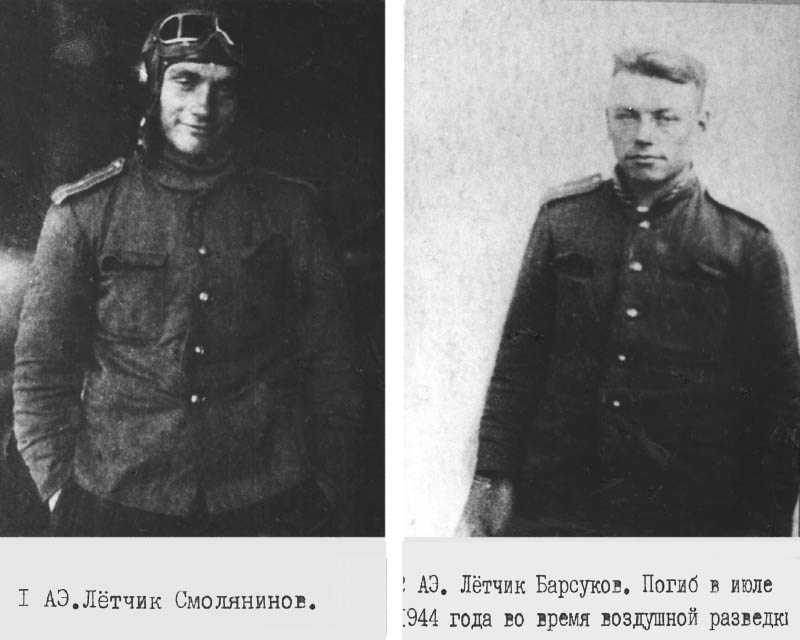 Left: Viktor
Smolyaninov.
Left: Viktor
Smolyaninov.
— Viktor Smolyaninov.
Smolyaninov was an excellent fighter. He was a master of dogfight. There were tales how they together with Tikhomirov chased pilots from the Guards unit over Lavensaari in a training dogfight…
— HSU Udaltsov?
One friend invited me to Tbilisi. I boarded a plane, a stewardess came out
and announced:
— Dear passengers, our airplane is about to take off for a flight Moscow-Tbilisi.
The crew commander, first class pilot, HSU Udaltsov is glad to welcome you aboard.
I called her, and said:
— Tell this Udaltsov that I’m here.
She went to the cockpit and Yefim rushed out:
— Hello! Let’s go to the cockpit, and take a seat at the right chair.
I’ll fly the plane and you will help me. Let’s fly to Caucasus.
We trained together near Samara when there were frosts. We flew there for flight
practice. I was there a Starshina of cadets company. After the flights cadet
Udaltsov came to me:
— Starshina, take a look, I lost gloves and my hands are frostbitten.
I went to the hospital, where the female doctor said:
— It is bad, your bones had died out and I’ll have to cut away three
fingers.
— But then, — continued Udaltsov, — a hospital aid came to
me and said: «Sonny, this witch is going to cut away your fingers, but
I have herbal medicine. You have to change bandages daily, soak and change every
three hours so that the medicine stays fresh. If you would get an official leave
for three days I would cure you, and save your fingers».
I said:
— Go.
But I haven’t reported to the squadron commander Captain Nikolaev. Two
days later it was discovered that Udaltsov is AWOL. If he is absent for three
days – that’s a desertment. I was demoted from Starshina duties,
although quietly. Then Yefim came with normal fingers, except that they were
white. There was no need to cut his fingers now. He was very grateful to me.
We arrived to Tbilisi, I spent several days there and returned.
Some time passed, his son Vladimir called me:
— Uncle Aleksey, my dad perished.
His wife came to me to find out what happened, and spent a night at my place.
What actually happened: he came in at night and initiated landing approach.
Flight controller told him:
— Land at the second runway at Vnukovo.
He started landing approach, but the flight controller said:
— Break landing and go for the second run as we have to land the foreigner
first.
It was night and there was a snowstorm. He tried to go around. Some fool placed
a firebox with sand at the end of the runway. He was given an order to go round
almost when he touched the ground. He pushed throttles forward, but the engines
had slightly different thrust and the airplane banked a bit. If he was a bit
higher, he wouldn’t catch that box with a wingtip. Just a little bit…
He crashed and perished. Others stayed alive, I think, and the stewardess broke
her back. All others were sitting, while she was standing.
What a pilot he was! He was captured and escaped from the POW camp… He
told me about this…{34}
— I would like to write about Suslin.
And I want to tell you about the 35th regiment commander Ivan Suslin.
We flew to Sinyavinskiye Heights. There all pine tree branches were shaved by
shells and the tree trunks were like poles. We flew between them. We returned
to the base. I reported to him that the weapons worked fine and the airplane
was also fine. He said:
— You flew well. Good.
No emotions – "Good, well". Suslin was very serious man, and
you couldn’t understand anything by expression on his face. A technician
came:
— Comrade Major, there is a mine stuck in your fuselage.
— What do you mean stuck?
— The mine had pierced a wooden fuselage, and its stabilizer is sticking
outside.
The fuselage was made of wood. The airplane was dragged away from the parking
area in case it will blow up. They started to cut a piece that was a routine
operation as shturmoviks received numerous hits. One old airplane that must
have flown from the beginning of the war was all in patches. You could see with
a naked eye where things were repaired. And here the mine was stuck! Apparently
they were shooting at us not only from automatic guns but even used mortars.
One of them met the airplane.
How can I explain how did I like my commander. He respected me, but sometimes
he was also strict. And I know that he was unjust towards my second wingman.
He had flown 117 missions. After 100 missions pilots were nominated for the
HSU. He used to live in Leningrad. I came to visit him. He used to be an outstanding
pilot but now he developed cancer and hardly could walk. We sat together, talked
a lot, and recalled things. He was angry at our command. I left, and four days
later he died…
By the way, my second wingman had 5 Orders of the Red Banner. I found one of
them in the dust near a beer kiosk. I noticed it and picked it up. He came to
me at the end of the day:
— Batya, I lost an Order, it unbuckled.
I said:
— What do you expect me to do?
— Well, you understand, it’s an Order.
— Fine. Stand still and close your eyes. Now listen carefully the magic
words: "Ahalay-mahalay, Ahalay-mahalay". You honestly received this
award, so I have to make it return to you. "Ahalay-mahalay, Ahalay-mahalay".
Open your eyes, your Order had returned!
When he lost his Order he was not drunk, we just drunk a bit of beer, and the
Order unbuckled. Bad luck… He later went in a boat on Don River, looked
out into the water and the Order unbuckled again and fell down in the water.
It was not found. Five Orders of the Red Banner was a rarity. He received one
for shooting down a border intruder during the Cold War.
He flew over Moonsund Archipelago. On the next day there were supposed to be
grand Baltic Fleet maneuvers. Americans found out about it, and sent in a Swede
in a flying boat Catalina, to cross our border. He did not obey commands, which
usually are given to the intruder. Nikolay sent a trace in front of his nose,
banked his wings signaling to turn around. But he kept flying to Sweden…
the intruder was Captain Lunstren — a Swede and experienced pilot. He
almost made it to the neutral waters. Nikolay {Semernikov} aimed, «bam»
at one engine, «bam» at second. Otherwise fully safe boat landed
in the neutral waters. The Swedish ship was waiting for him there, our sailors
had no order to catch him and missed catching him. Nikolay and his wingman were
awarded with the Orders.
Captain Lunsrem wrote a letter to Nikolay and everything became clear. The Swedish
TV also came. By this time Nikolay divorced. I arranged a one-room apartment
for him with a help of TV, veterans and the Communist Party regional committee.
The Swedish TV made a film about the pilot, who shot their pilot down and managed
to kill no one. All of the crew was safe. Lunstren wrote him a letter that a
fragment from the engine bounced and scratched his navigator's chick.
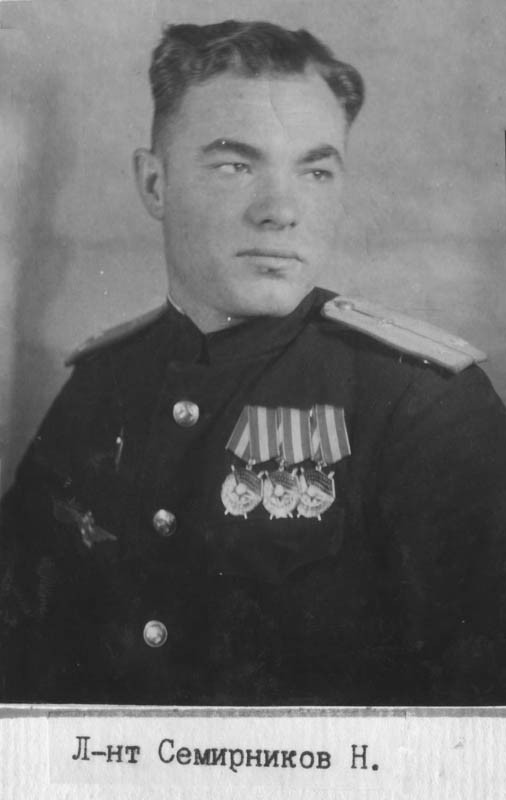 Lieutenant
Semernikov
Lieutenant
Semernikov
Appendices
1. Alexei Batievskii
Born 12.03.1921 in a village Gorodishe, currently Chernukhin region of Poltava
area, in a peasant’s family. Ukrainian. Communist party member from 1944.
Graduated from Lubny Pedagogical Institute in Lubny, Poltava area. Joined the
Navy in 1940. Graduated from the Naval Aviation School in 1943. Deputy squadron
commander of the 35th ShAP (9th ShAD, VVS BF) Senior Lieutenant Batievskii by
the end of October 1944 had accomplished 130 combat missions, destroyed 6 ammo
dumps, 16 hardened shelters, 7 field guns and 5 mortar batteries. Received the
HSU on 06.03.45.
In 1945 graduated from the Higher Officers Courses of the Naval Aviation and
in 1950 from the Higher Officers Flight-Tactical Courses. Lieutenant-Colonel
Batievskii retired from the service in 1957.
2.Yevstafii — Russian battleship (1911—1919). During WWI —
a flagship of the Black Sea Fleet. Was assigned to the Black Sea Fleet on May
28th 1911. From March 1918 was anchored at Sevastopol, where on May 1st 1918
was captured by the German Army and on November 24th 1918 by Anglo-French forces.
On April 22-24 1919 by the order of the British command she was blown up and
wrecked. In 1922 it was transferred for disassembly and metal scrap and excluded
from the force on 21 November 1925.
3. Levanevskii mine-torpedo school story begun in 1939. School existed for 20
years, training over 6 000 aviators. It was disbanded in 1959 during Khrushchev’s
military reforms.
4. Founded on 28.07.1915 as Officers school of naval aviation, currently exists
as Order of Lenin, named after twice HSU pilot-cosmonaut V.M. Komarov filial
of Air academy named after Y.A. Gagarin.
5. Nikolay Kuznetsov was born on 11 (24) July 1904 in a village Medvedki Archangelsk
oblast, died 6 December 1974. Fleet Admiral during 1939—1947 and 1951—1955
was a chief of soviet VMF. Member of TsK VKP(b) during 1939—1956. As VMF
was a separate Narkomat it did not obey to the order by Timoshenko and Zhukov
issued on 21 June 1941 about «possible provocations», Kuznetsov
by his own order had placed all Flotillas and Fleets into combat ready status.
As a result on June 22, at a day of German attack VMF haven’t lost a single
ship or airplane, but on the opposite put out a stiff fighting.
6. Ilya Mazuruk was born on 7(20) July 1906, died on 2 January 1989. Soviet
Polar pilot, HSU, General-Major of aviation.
7. Crew from the 7th GvShAP VVS BF: Jr. Lieutenant Medyankin Alexei and Jr.
Sergeant Pyshnenko Vasilii where shot down by AAA fire on 18.03.44 over Gulf
of Finland.
8. On 26.05.1944 in an area of Tana-Fyord three A-20 crews from 9th MTAP SF
had perished, including crew of Petr Gnetov.
9. 35th Shturmovoy Tallinn, Red banner, Order of Ushakov 2nd degree air regiment
VVS VMF.
Regiment commanders:
Colonel Alexandr Petrov 11.42 - 01.09.43
Major Dasha Akaev 01.09.43 - 26.02.44
Lieutenant-colonel Vasiliy Kuzmin 08.03.44 - 09.44
Major Ivan Suslin 09.44 - 11.47
In November 1947 was disbanded, part of crews and equipment was passed to 7th
GvShAP.
10. This time KG1 was hit. German loss-lists have no indications of losses that
his group suffered, but photographs clearly show that at least 2 planes were
severely damaged or destroyed.
11. It seems that it is Capitan Petr Potapov, pilot of 47 ShAP VVS ChF described
here. On 03.04.1944 he did not return from combat mission.
12. Lidiya Shulaikina (28 march 1915 — 15 July 1995) — the only
female shturmovik pilot in Naval aviation. Graduated from 3rd Saransk Naval
flight school in April 1944, fought with 7th GvShAP VVS KBF (57 ShAP VVS KBF).
Had accomplished 36 combat missions from 26 august 1944 till 9 May 1945. Sunk
3 Merchant ships, patrol boat and barge. Finished war at a rank of senior lieutenant.
1 October 1993 Lidiya Shulaikina was awarded with a rank HSU.
13. Pilot Jr. Lieutenant Miroshnichenko Petr and Jr. Sergeant Kremkov Nikolay
were killed on a ditching attempt in a Gulf of Finland on 21.8.44.
14. In 35th ShAP two pilots with a surname Kuznetsov…
15. On 26.02.1944 following crews did not return from a mission against Rakkvere
airfield:
Regiment commander Major Dasha Akaev-Kapitan Alexandr Trohachev.
1st squadron commander Major Grigorii Reutov-Lieutenant Mikhail Onufrienko.
Lieutenant Konstantin Golikov-Juniour Lieutenant Alexandr Logvinov.
Junior lieutenant Vladimir Davitashvili-Lieutenant Alexander Shutko.
Juniour Lieutenant Nikolay Nikulin-Juniour Sergeant Mikhail Novoselov.
16. On 15.01.1944 one of three crews lost consisted of:
Capitan Konstantin Balitskii and Lieutenant Israel Yulish. Both returned from
captivity.
17. Normal takeoff weight of Il-2 AM-38f with NS-37 differed from Il-2 AM-38f
by 130-140 kilograms.
18. On 13.02.1944 in a collision in mid air two crews perished:
Junior lieutenant flight commander Alexander Yevstigneev and Junior sergeant
Vladimir Kamyshov.
Junior Lieutenant Pavel Sudakov and junior sergeant Ivan Moiseev.
19. Firing Ns-37 could not be arranged in synchronous way for a long time, since
it used mechanic trigger mechanism. The only way to ensure it’s synchronous
firing was to use electric trigger.
After shooting 4-6 rounds airplane lost 30-50 km\h of speed and gained negative
AoA, thus loosing target. Only first 2-3 round hit target, while all the rest
fell short of the aiming spot, but it was much better then tank-busting Ju-87,
where guns were positioned much lower then CoG.
Comparing Il-2 with NS-37 to standard Il-2, it was much less stable, thus it’s
aiming was more complicated, with more serious dispersion.
Due to heavy recoil of NS-37 pilots were afraid that airplane could disintegrate
in mid-air after a long burst. Such cases were reported by documents.
During test firing at NII AV it was established that recoil of NS-37 after 1500-3000
broke it’s mount, further use of cannon could lead to breaking wing longerons.
20. La-9 arrived after the war ended.
21. Il-10 surpassed Il-2 by flight characteristics, but surprisingly turned
out to be less combat effective then Il-2.
22. It is unlikely that military commission accepted airplane unpainted. Most
likely it was colored white above standard cammo.
23. Aiming with VV-1 was less precise then with PBP-1B, but on the other hand
it was easier and faster to use. It was installed on the airplanes from summer
1942.
24. Aiming was done by special marks on windscreen amd on upper engine cowl.
Precise (more or less, it highly depended on quality of a pilot) bombing could
be done up to the altitude of 300 meters.
25. During training flights at Bogoslovo 4 pilots and 3 gunners were killed.
26. Fighter version of Il-2 – Il-2I or I-Il-2 was built in small numbers
(no more then 50 planes). It was a standard Il-2 with improved aerodynamics,
with no bomb bays and machine guns.
State tests showed that this plane was not better then currently existing fighters,
so it was decided to stop production. All previouselly produced planes were
sent to different units, but according to existing documents there was no use
for them there too.
27. Increase of arrow at the front edge of a wing on late models Il-2s was made
to increase stability in pitch axis.
28. Igor Ladnov and Ivan Ilyasov were killed on 29.10.44 at Ezel Island during
attemted forced landing of a plane damaged by AAA.
29. Il-2 crewed by Yevgenii Borin and Alexei Filtsev crashed into boulders on
24.10.1944 during attempted emergency landing near village Karela on the Western
shore of Ezel Island.
30. Crew Vassilii Yushkevich and Ivan Ustinov was killed in a crash in Gulf
of Finland on 10.9.1943.
31. Petr Kulakov took his wife and flew to Gatchina airfield on 05.12.1941.
His fate unknown. On his account there was a Pe-2 shot down on 24.07.41 and
SB during Finnish war.
32. Airplane crewed by Alexander Chekhlotenko and Yakov Kabanets was shot down
by AAA in Sinyavino area on 15.09.1943.
33. Junior Lieutenant Mikhail Yavasov from 12 IAP VVS BF, shot down by AAA on
24.04.44 over Azeri.
34. Yefim Udaltsov was a deputy squadron commander in 47th ShAP when he was
awarded with Hsu title on 06.03.45. From 1947 Capitan Udaltsov had retired.
Lived in Tbilisi. Worked as an Aeroflot pilot. Perished in an airline crash
on 07.12.1973, when Tu-104b Nr SSSR-42503, belonging to Georgian UGA had caught
the ground on final approach in Domodedovo. There were 7 crew members and 68
passengers on board. 5 crew members and 11 passengers were killed. Commette
came to a conclusion that there were two reasons for the crash: crews mistake
and difficult weather conditions.